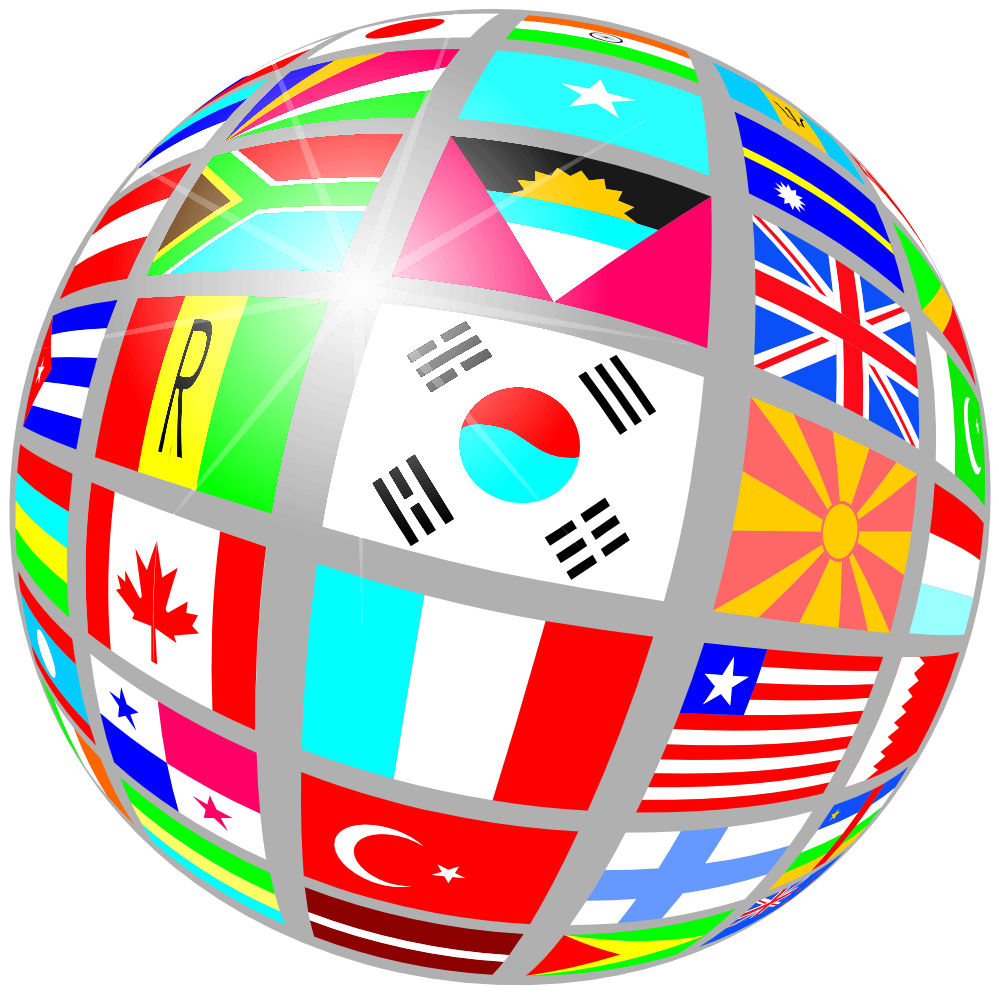

International - Europe

Training Session for South Sudanese Journalists
by Nicholas Mungai Waigwa - Correspondent (Nairobi), Sept 29, 2016
Even though developing countries host 80% of the total number of refugees worldwide, the Europe refugee crisis continues to be top trending among the leading stories which are currently under the media watch across the world. Hundreds of thousands of asylum seekers have recently been fleeing their home countries for safety in developing countries such as the United Kingdom. The British Red Cross reports on their website that the UK had 117,234 registered refugees at the end of year 2015.
Of the refugee population in the UK are individuals who had established, or were developing their careers before violent conflict forced them out. Journalists are among those of professionals whose career paths were shuttered by conflict. A collaboration of two institutions in the UK has seen the need to create a bridge for the refugee journalists to continue with their profession and tell the refugee story.
The two institutions – the London College of Communication and the Migrants Resource Centre in an update on the ‘The Refugee Journalism Project’ on migrantsjournalism.org dated August 27, 2016 noted, “The refugee crisis is not disappearing anytime soon, so it’s important that we think about how these new arrivals rebuild their lives. Many of them have important contributions to make to the UK, but just need a little bit of support to achieve them."
The Refugee Journalism Project employs a strategy which incorporates mentoring, journalism workshops and internships in its quest to support refugee and exiled journalists in re-establishing their careers in the UK, develop their skills and help them obtain employment in the mainstream media. Refugee journalists who have confirmed refugee status from countries such as Syria, Sudan, Pakistan Eritrea, Afghanistan, Iraq, Yemen, and Bangladesh are among the beneficiaries of the project.
A highlight feature of the initiative is the pairing of refugee journalists with experienced journalists from renowned media organizations. The mentors design their guidance in response to the mentees expectations and they have taken them through universal values of journalism, UK media law, pitching stories for radio documentaries, generating investigative pieces and feature articles.
Participants at the workshops organized by the Refugee Journalism Project have decried the “dehumanization of the refugee story” and called for clearing of the “stereotypical narrative of migrants jumping off boats and trucks.”

Another image of a training session for South Sudanese Journalists
Two of the beneficiaries of the project have been secured for internship opportunities at Airwars – a group that monitors civilian deaths from drone strikes. The project’s success story has also attracted the attention of journalism undergraduate students at the London College of Communication. They have volunteered to work alongside refugee journalists, support the project’s website and filming activities.
The initiative has stirred a conversation among other players in the media development arena. The Media and Development Network for instance has invited their members to assess the project from a media development perspective and share their experiences and perspectives regarding the strategy in use, and the applicability of the principals that underpin the initiative to other major issues that create media headlines.
In August 2016 a similar initiative to the Refugee Journalism Project gave five refugees from the Kakuma refugee camp in Kenya and others from the Syria, Democratic Republic of the Congo, and Ethiopia an opportunity to represent the refugee community at the Brazil’s Rio Olympic games in the first ever Refugee Olympic Team. UNHCR and the International Olympic Committee backed the 10-member team comprising of 5 refugees from the Kakuma refugee camp in Kenya and 5 others from Syria, Democratic Republic of the Congo and Ethiopia. The presence of the refugee team at the 2016 Olympics according to UNHCR was to pull global attention to the magnitude of the global refugee crisis, and also a symbol of hope for refugees worldwide.
Vivienne Francis of the Refugee Journalism Project which also grants refugees a chance to live a dignified life observes that some of the refugees also have fundamental barriers that require attention, “The trauma of the last few years has left some in need of emotional healing.” Adding that from a journalistic perspective the initiative for refugee journalists hopes “to help change the narrative around migrants – too often they are cast as terrorists, parasites or victims”
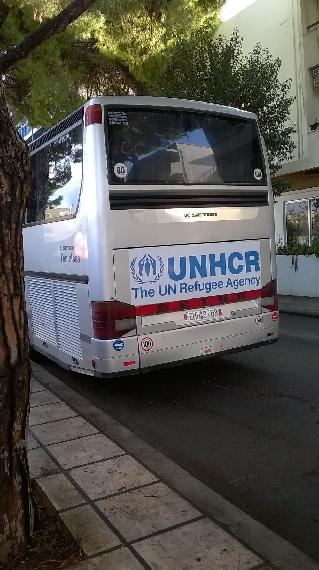
UNHCR bus parked outside hotel where refugees are being accommodated (Photographer: Emma Stuart)
by Emma Stuart - Correspondent (Kos Island), February 2, 2016
As winter fully settles across Europe, harsh weather conditions are making the migrant journey across the Aegean Sea from Turkey to any Greek island the refugees may land on extremely dangerous. Despite this fact, thousands are still risking their lives in a bid to make their way to a safer Europe. According to sources, refugee population numbers fell to as low as 30 people on the island of Kos over the Christmas period, but unfortunately reports of fatalities during the crossing have increased over recent months (editor’s note: The International Organization for Migration reported on Feb 2 that 60 children under the age of 18 died crossing the Aegean Sea in January and 82 in December).
The plight of refugees and migrants across the Aegean Sea is becoming ever more perilous. The journey has not only become much more hazardous, it is also much colder and windier which is making it harder for them to steer or row their boats to shore. The majority of the boats are often over capacitated and cannot withstand the number of passengers on board, which combined with a lack of nautical knowledge on the part of the passengers and strong winds can often lead to them capsizing.
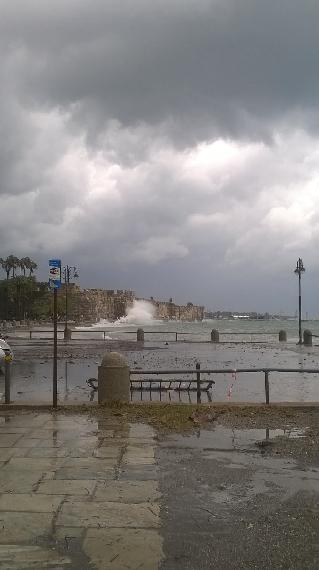
Strong winds at Kos Harbour
A group of Pakistani migrants who were found walking along a back road some 2 kilometres away from the town and police station, bare foot, wet and cold, stated that their dinghy drifted away from the central beaches due to strong winds. They retold the story of how they had to battle to row the boat to the shore and prevent it from being blown further out to sea.
Prevalent winds at this time of the year are causing many of the smaller boats to pass the town and head further north to the eastern part of the city’s beaches. One group of migrants who were being put up in a local hotel said, “we were trying a long time to get to the shore.” One of the men, an 18 year old Pakistani national, stated “in the end, we had to get in the water and come to shore ourselves. The wind was too strong.” Asked how he felt about making his way to mainland Europe on foot he expressed fear and worry yet stated that, “hopefully, we will make it. We know it’s a long way to go and it will be hard, but we will try.”
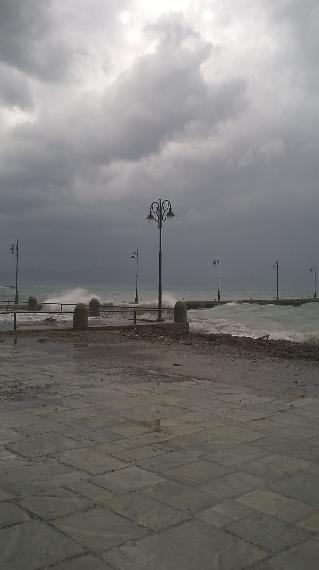
Windy day on Kos Island, Greece
The Greek coastguard and Frontex (EU agency for European border management) are continuing to work throughout the day to patrol the coastal borders between Kos and Turkey to rescue those in need. When the refugees and migrants are picked up by authorities the immediate processing of their documentation begins.
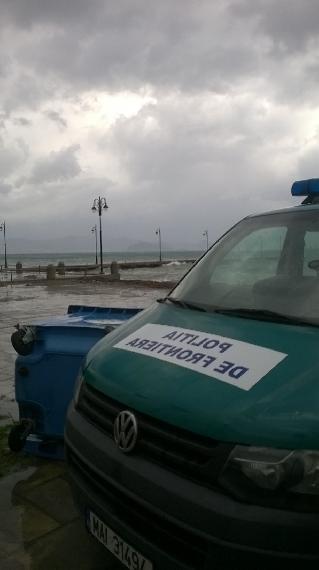
Frontex Vehicle
Kos Solidarity, a local charity, is working closely with the UN, local authorities and other aid organisations to help assist those arriving under such cold, wet and windy conditions. The group is often on hand to administer blankets and clothes the minute boats arrive and many local members of the group continue to cook meals, some up to 60 servings a day, in their own homes to administer to migrants and refugees upon arrival late at night (editor’s note: Greek Islanders were nominated by an International group of academics on Feb. 1 for the Nobel Peace Prize for their volunteer work in helping refugees).
In an interview for Sincere Global, a ‘Flying Humanitarian Communications Officer’ for Medicines Sans Frontiers (MSF) stated that despite the harsh winter conditions ripping through Europe and causing a dip in refugee numbers, over 44,000 have arrived in Greece so far this January. According to the source, MSF have set up medical camps across Greece including the islands of Kos, Leros, Lesbos, Samos and in the capital, Athens. The source also noted that medical camps were functioning along the refugees’ route across Europe in Serbia, Macedonia and Italy.
According to the officer, MSF staff offer immediate medical assistance to those arriving at the camps and in Lesbos they are even carrying out rescue missions when refugees find themselves stranded at sea. At all MSF medical camps across Greece and Europe, trained nurses and doctors are constantly on call to offer their services which are unfortunately “limited”, however, as the source added, "we do work closely with authorities in case immediate referral to a hospital is needed."
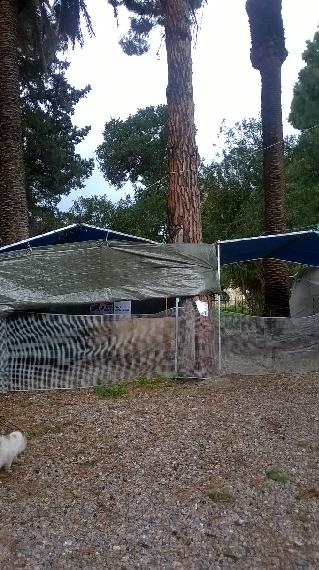
Medecins Sans Frontieres Medical Camp, Kos, Greece
During the interview, the MSF officer mentioned that when refugees arrive on the Greek islands, aid organisations do everything they can to ensure appropriate shelter such as a hotel room is provided and that their camps are only used as a "last resort".
She continued by explaining how the route for refugees begins when they have received their documentation and they can then book a ferry ticket to Athens and from Athens they purchase a bus ticket to reach the Greek border with Macedonia. From there on in, there is only one route available which must be crossed on foot. The officer said that many of the refugees worry about the journey, questioning whether or not disabled members of their group or small children will be able to make it that far.
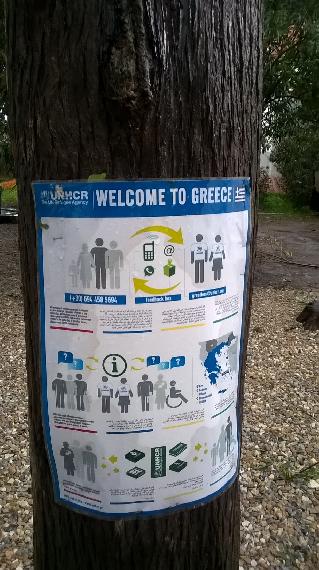
Important information for refugees on display at UN camp
Responding to a question regarding how the winter weather conditions are affecting health, the source stated that over half of the refugees who are arriving in Greece are suffering from respiratory tract infections as a result of the cold and wet weather. She continued by adding that, "another 10% are suffering from gastro intestinal diseases as a direct result of poor hygiene, 10% suffer dental problems due to the fact that they cannot brush their teeth along the journey, another 10% of refugees are suffering long-term chronic illnesses such as diabetes, for which they can no longer access medication, and an equal number are suffering from trauma and injuries as a direct result of war."
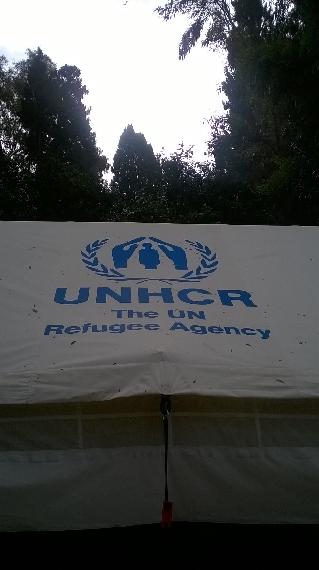
The United Nations High Commissioner for Refugees
As the MSF team are working day and night in outdoor camps to provide shelter, food, clean water, electricity which is provided by solar panels and medical services, the source claimed that it does get hard at times. On Saturday evening, the 24th of January, the MSF team in Eidomeni on the Greek border with Macedonia were waiting for 50 buses to arrive from Athens in extreme weather conditions. “It was so cold, the wind was just horrific” the source said that temperatures had dropped to -9 degrees Celsius.
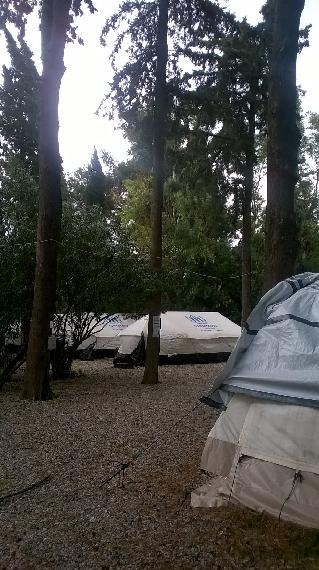
United Nations shelter

Care4Calais Volunteers (Photographer: Daniela Villeneuve, Team)
by Daniela Villeneuve - Volunteer (Cologne), Jan. 5, 2016
Dec. 30, 2015
Here we go starting our third convoy to Calais, France, heading to the camp widely known as the “The Jungle”, Europe's largest refugee camp (7000 people) outside the Port of Calais on the French coast, at its closest point to the United Kingdom, which is connected by the Chunnel roadway across the English Channel.
We have two vans with a total of 3 tons of aid supplies loaded, including 1.5 tons food. We have 300 identical "food parcels" (a bag of groceries and emergency supplies for 2 People & 2 days) packed.
We thank all those who made possible this convoy; in particular the Telekom, Cologne, Germany, the team of the Cologne hub and all donors of men's clothing!
We wish all our followers a good start into the new year!
Your team "Convoy Calais"
Daniela Villeneuve Dominique Vcb, Anna
Dec 31, 2015 - morning
After a night in the hotel, we are this morning heading with the van went into the city to find more food to buy. Part of the team has meanwhile been ‘Lucky Bag” packaging (a garbage bag with a set of used clothes - socks, underwear, leggings, hat, scarf, soap). The output of these two goods is urgent, but also because of hunger and cold we were concerned that the refugees would be angry. We have only met friendly refugees. With tears in their eyes at the sight of the parcels and bags we brought into the reception area. For most of us, this was the first contact with people who are really suffering from hunger.
Strange is this gigantic contingent of the riot police. Next to our hotel is the base. During the night we see 15 water cannon, generators and countless crew wagons being prepared. The police are gearing up with tear gas, anticipating a possible confrontation at the camp from right-wing elements.
We are in the center of the city, because a stay in the camp is too dangerous to move supplies at night to the hundreds of injured.
Dec 31, 2016 - afternoon
We arrived today at noon at the camp outside the Port of Calais, and connected with our friends from care4calais.
Together with the team we unloaded the donations in the warehouse and then drove to camp, to start the food distribution from our van. Within a few minutes had a 100 meter long queue of refugees/migrants, which we managed with six volunteers to maintain an orderly process. Many people here are so desperately hungry that they would do everything to find a bag of groceries to get. It's incredibly frightening; in what conditions people have to live here.
We had nice adventure with a group of Sudanese whom invited us for tea and shared a meal with us from the food parcels them obtained. We had a lot of handshaking and quite often, " thank you " and " Germans are good people " heard.
Happy new year
Jan, 2, 2016
We have several distributions in the camp organized: 300 food parcels, jeans, and gingerbread. The remaining 1600 aid packages at Elisenlebkuchen Cologne Metro are now completely gone. The Afghan refugees have told us afterwards that they soaked our gingerbread in water and used it as a sauce with the rice.

200 ready packed food servings ready to issue (from 1500 € donation)
Yesterday, I have been working the whole day in the medical caravan and doing wound care. Since there are a lot of refugees with no or very torn shoes, there are many deep and very inflamed wounds on the feet. Some of the refugees are showing signs of frostbite on their feet as well. They are in need of shoes appropriate for the winter conditions.
This morning we left the camp and headed back home, while promising to come back again with lots of helper
The camp at Calais, widely known as ‘The Jungle’, is a slum in the middle of Europe, just 4 ½ hour drive from Cologne, with people sleeping in dirt wade deep into the mud, limited medical supplies, and hunger.

Mud conditions in the camp
Let us bring together quite a lot of people and help there. Shoes and food are urgently needed goods. We can move a lot of supplies here with minimal effort. We will be back! Cologne4Calais.

Many refugees in the camp wearing worn-out shoes.
Jan 3, 2016
I would have never dreamed three and a half months ago that I would be asking friends and acquaintances for food and used shoes. But now it's time... After 4 days in the 'Jungle' of Calais, we are still speechless that it in the middle of Europe there is so much poverty.

Map of The Jungle
We have packed and distributed 500 food parcels, provided wound care and distributed warm clothing and sleeping bags. Nearly 7500 refugees/migrants, mostly male, are waiting at the camp for the opportunity to cross the channel over to the UK.

Shopping in Calais, for rice, beans and tuna cans for 200 packs.
There are also medically in need (many lacerations / frostbite because the people have no or very poor footwear), sore eyes from the tear gas, scabies, and cough and flu, are the most common problems. We provided medical assistance to a 8-year-old boy whose legs where badly injured by bites from border police dogs.

Medical station in the camp
The "Camp", slum would be the better expression, is divided by nationalities of the refugees/migrants: Syria, Afghanistan, Sudan, Eritrea, Ethiopia,.. The refugees there are trying to organize themselves. Working at the camp is possible only with rubber boots, because the dirt (mud, garbage, trash, ..) is in places knee high. There is no electricity, very few water stations and hardly any toilets. With a population of 7500 people, everyone can think for yourself how it looks there.

Water Station in the Camp
People stand there sometimes for hours for a pair of pants or a bag of groceries.

Van loaded with aid supplies
EUROPE - it's a shame

UNHCR and other aid agency tents supporting refugees on Kos Island (Photographer: EmmanStuart)
by Emma Stuart - Correspondent (Kos Island), Dec. 9, 2015
According to United Nations High Commissioner for refugees (UNHCR) figures, nearly 800,000 migrants and refugees, mostly from Syria, Iran, Iraq and Afghanistan, have made their way to Greece since January 2015. While the refugee crisis on the island of Kos has experienced a gradual decrease over the past two months, migrants are still arriving each and every day with recent UN statistics asserting that 20,325 refugees have arrived in Greece in December alone.
On the island of Kos, various philanthropic organizations from all over Europe are continuing to grow their presence and administer humanitarian aid and support. In November, a UN transit-facility was established on the island to protect children who the UN claim are often being abused and tortured along their migration routes. Many, they say, are left to travel alone to seek relatives across Europe after losing their parents and families in their homeland.
In late October, when the first intense rain fell after the summer, large numbers of migrants/refugees who were camping at the harbor found their tents being blown into the sea and all of their few belongings getting soaked and destroyed. The incident prompted their quick relocation from the city’s harbor where waves were making their way onto shore.
Behind the cafes that line the harbor front, next to the police station where the refugees camped throughout the summer, a small UNHCR camp was established and continual medical support is being offered by the Médecins Sans Frontières (MSF) team. Huge tents have been erected, blankets and information are handed out to help the refugees on their way to mainland Europe as well as free Wi-Fi access and bathroom facilities being offered. An official for the organization could not offer a statistic on how many migrants are now arriving on Kos, he did however state that there has been a decrease in arrivals on Kos and that "more migrants are now traveling to Lesbos but we are unsure of the reason why."

UNHCR tents in refugee camp

Wifi hotspot in camp

Solar power station in refugee camp
Three young Sunni men from the same town in Iraq who when talked with outside of the camp stated that they were staying in a hotel and did not to stay in the camp as it was currently mainly Afghans and Iranian nationals.
They indicated that part of their reason for fleeing was the increased presence of Hezbollah, a Shiite Muslim political party and militant group, in their hometown. They said that they had lost two homes and a car in an attack. It appeared they expressed anger towards Iran. Thus, this made it uncomfortable to reside alongside refugees from Iran.
One of the men said that bombing and violence in the northern town, close to the Turkish border, had increased over recent months and that their situation was "desperate". Continuing he said, "we have nothing left there now, we travelled here with our families because it is too dangerous." Retelling the story of their trip through Turkey, in contrast to other reports of difficult conditions in the country, they claimed they were treated well and see Turkey as an ally. They did not, however, express the same sentiment for Iran, stating, "Sunni Muslims were being persecuted and that growing violence on the streets and air raids in the area made life there impossible."
Asked when they would be making their way to Europe, one member of the group motioned to his phone and stated "a part of the border at Macedonia opened this morning so we hope to leave today." Showing no fear of the journey ahead, one of the young men cited Finland as the country he wished to seek refuge in, another hoping to settle in Germany and the young man who had lost his home and car in a recent air attack laughingly said "I don’t care. I just want to buy a new car."
In comparison to rates paid by migrants during the summer months to cross the stretch between Kos Island and Turkey over the Aegean Sea, they stated they arrived on an "old, wood boat" with 35 other people, each paying $118. During the summer, most refugees we had talked to cited $2,000 as the average cost per person to cross.
This lower amount was also paid by a group of Pakistani nationals who were sitting outside the police station awaiting their official documentation from the police station. "We come with a row boat for $100 each. It was only me and my friends in the boat" one man said, claiming they were fleeing Pakistan due to increased fear of raising tensions in Afghanistan. "Our boat turned over, it was so cold and scary." He said, explaining that it took them three hours to cross the stretch and eventually the windy conditions led to their boat, which was being rowed by the four men, overturning near the shore. :It was terrible. So terrible. The boat was out of control and we couldn’t see anything", another member of the group added.

Scuttled wood boat in the harbor

Multiple scuttled boats in the harbor piled together

Remanents of another scuttled boat in the harbor
Arriving at night and under extreme conditions out at sea, it is not uncommon for reports of fatalities and missing persons to arise. While conditions for migrants have improved over recent months, officials are still claiming that the crisis will only worsen.

Abandoned dingies in the harbor
As the winter weather is starting to take effect, one MSF official said to us that the UNHCR is offering hotel accommodation to refugees in need of shelter on the island. A fact confirmed by the three Pakistani nationals who claimed they had been offered a hotel stay for one night by the organization. The official also confirmed that medical assistance was being offered by the organization around the clock including assistance from social workers, translators, psychologists and lawyers.

UNHCR tents in refugee camp

Tents of other aid agencies in refugee camp In a bid to deal with the oncoming influx and uncertainty of the country’s borders, a ‘Welcome Centre’ in the Linopoti region of the island is to be constructed as part of an agreement made by the Greek government and the European Union. However, some residents of the island staged a protest on Monday 7th December as army officials began transferring prefabricated homes to an abandoned army base.
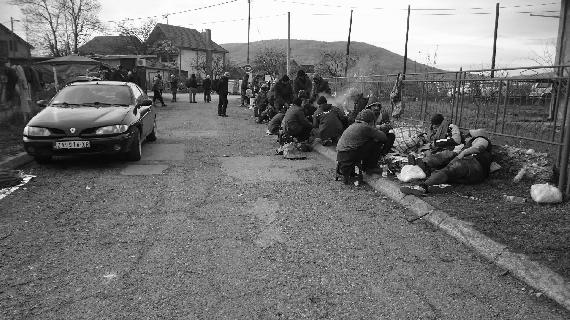
Border camp at Dimitrovgrad, Serbia (Photographer: Nicole Malmedé
by Nicole Malmedé - Volunteer (Cologne), Dec. 2, 2015
After five days and shifts delivering clothing and blankets and serving refreshments at the refugee camp in Dimitrovgrad in Serbia near the Bulgarian border (Nov. 27th – Dec. 1st), our team headed back to Cologne, Germany. We are exhausted but happy to have helped the Afghanistan refugees in the refugee camp.
We would have liked to stay longer but our families and work are calling us back. It is certain that we will be returning in the near future to Dimitrovgrad, after all the misery and suffering we have seen in the eyes of these young Afghans.

Nicole with Afghan refugees
Some of the Afghan refugees told us why the left Afghanistan to Europe, knowing at times they may be risking their lives. We listened to stories of persecution, ill-treatment and killings in Afghanistan by the Taliban. The majority of the refugees we saw were between the ages 15 and 24 years. For the fear of Taliban they left everything behind in the search of a life in peace.

Afghan refugees in rain gear getting warmed by fire
We have seen many physical injuries in the refugees, the psychological injuries we could only guess. In Dimitrovgrad there appears to be a permanent lack of shoes and hats. Gloves, scarves, jackets, rain coats and blankets are needed as Winter approaches. Everything our team could bring to the camp in view of the amount of refugees is always only drop in a bucket. To ensure supplies for the refugees, about 400€ per day are required and five volunteers per shift would be perfect.

Afghan refugee with visible injury

Another Afghan refugee with visible injury
FIRST TRIP TO DIMITROVGRAD (excerpt's from team log)
26.11.2015 – 10:45 p.m.
BALKAN-TEAM:
Good News: the great mystery, namely the import of the truck, worked perfectly, the continuation of the journey to Dimitrovgrad is possible right now!! Those who remember the problems of our last convoy, know how happy we are and look forward to reach our destination: ALEX und TORSTEN, you did a great job !!
27.11.2015 – 9:00 p.m.Our Team arrived well. The Weather is horrible, it rains heavily and it's cold! The volunteers work in 5 hour shifts and have a tent outside the camp. The camp itself consists of some containers, where a minimum of care can be given to the refugees, all controlled by the police.
Regardless of the circumstances our Team is distributing rain clothes, dry clothes as fare as they are available, such as a basic food, tea and sandwiches. Apart from the human warmth that the Team is giving, the real “ heating/warmth “ is coming from burning wooden fruit boxes.
The refugees in this camp are mostly from Afghanistan, some families, the youngest boy today was 12 years old. Nicole tells us, that some where subject to brutal violence in Bulgaria. The house, where the volunteers can sleep is great – compared to sleeping in a car …. as far as sleeping can be concerned! The atmosphere between the team and all the others is good! Send a smile to the people there from more than 3100 followers!!! 28.11.2015- 5:30 p.m.Dimitrovgrad it is bitterly cold and first snow is falling. A lot of children between 12 and 14 years have arrived today . Our Team (Nicole, Jana, Cuba, Alex, Sascha and Torsten)had to heal wound feet and to distribute the donated scarfs, caps and gloves from all of you. It is very important, especially in these conditions to protect hands and feet from frostbite. The Team prepared and distributed tea, soup, cookies and sandwiches. The highlight of the day were the 35 kg(!!!) of dates donated from ANDREA BERCK entirely distributed in one day. THANKS Andrea, you made a lot of people very very happy!
29.11.2015 - 11 p.m.The situation in Dimitovgrad, especially concerning temperature was quiet hard. No rain today, but cold, the night is starry and very cold!
Even today our Team did humanitarian aid in form of pedicure, disinfecting and washing feet. Further they helped with the basic nutritional aid (chicken soup & sandwiches and sweet chai). Health care here means, that only unconscious people are send to the doctors (perversity of this statement is intended).
Human destiny to which our Team is being confronted on-site, is very hard for them: a 14 year old boy lost his brother and his friend in a forest and because of linguistic problems he had to be calmed by his peers.
We even feel completely helpless concerning the fact, that we know, that most of the arriving refugees have little chances to stay in Europe, even though all of them talk about the terror exercised by the Taliban. All we can do is to support the people. Most people would like to go to Germany, some even talk about Finland and Sweden as their destination, very little of them have been registered and could leave by bus to go to Belgradwe hope, that all of them find a place to live in peace and start a new life. The Team is going to sleep now, as tomorrow will be a hard day, because one crew of volunteers is leaving.
30.11.2015 - 6 p.m.
Dear followers,
in the today's update I would like to transmit you Nicoles original text:
5:55 p.m. Nicole to Christian:
“ My pictures resume the day quiet well. After 9 hours of distributing chicken soup and chai with Sascha, Kuba
disinfecting a lot of feet and built splints with disposable razors, Jana has been hard-working on the
documentation explaining the situation and helping where ever she could”.
→ Last shift 6:00 a. m. - 12:30 p.m. and off we go, leaving Dimitrovgrad satisfied, tired and a bit sad.

Volunteers serving hot tea to Refugees at Czech Point Chai, Berkasov (Photographer: Nicole Malmedé)
by Daniela Neuendorf - Volunteer (Cologne), October 15, 2015
After some days of resting, you'll find the travel report from our humanitarian aid support last week. We started Oct 13th with 11 people from Cologne/Bonn (including a German press team). After an 18 hour drive to the Croatian/Serbian border we delivered a part of our supplies (clothes, baby food, medicine) at a refugee camp in Opatovac/Croatia and then we drove further to a “green border” (unofficial border crossing) point in Bapska/Croatia. Even though the Croatian government had organized the refugee routing, they were transported by buses in 12 hour and more drives, the people had to cross the border by themselves by foot. The provisioning of food is still not well organized. For those staying in the camps, they are provided with food and medical care. But the camps are overloaded with people, there`s no possibility to stay or even to rest.
After a long and hard night giving out hot tea, food and clothes, we decided to try crossing the official Serbian border, and leaving EU-territory. With some risk, because the Serbian mostly blocked humanitarian transports, we got the permission to pass through the border check. At the “green border” pass in Berkasovo we delivered the second part of our goods. The situation there is so bad, an estimated 6000 people, including 2000 children, had passed through the border here in last 24 hours. Most of them crossed during the night. We see groups of small tents from Medecins Sans Frontieres (Doctors without Borders), UNICEF, and UNHCR – but they appear to all stop their service during the night. It is unfortunate they are unable to operate 24 hours, since the refugees need help especially during the night time, when the majority are crossing through green border passes in the dark and with children. (editors note: many of these children have traveled for weeks/months over thousands of miles, mostly in the dark of night, crossing challenging geographic barriers such as seas and mountainous terrain and man made such as barb wire. The provisioning of food, medical assistance, clothing and shelter for many has likely been inconsistent and possibly long periods of times non-existent. This is in addition to many may have trauma from what they experienced in zones of conflict which they are exiting from).
 .jpg)
Green Border at Berkasovo
We gave out hot tea, food and warm clothes. There are so many people that we just served the refugees which came on bare foot or with short and T-shirts. If we consider that the night temperature in this area is around 5°C (41°F) and mostly raining it must be horrible. I’ve seen fathers checking out their food stock and only eating if they could see that there´s enough for the kids. As well there are so many small kids and babies, some of them born on the exodus. At Berkasovo we saw no military/police or any official Serbian patrol. It appeared to be all organized by volunteers, which all are doing a great job to the refugees. During the night our team organized the groups to cross the border. With our own radio equipment we did the security and steward jobs to bring them to the Serbian border. An important job, as well as there are many unexploded land mines in the ground in the border area leftover from the 1992-95 conflict, where the refugees are unlikely to be familiar with the markers indicating areas not decontaminated of mines.

Donated clothing supplies for Refugees at Berkasovo
We’ve seen so many children, suffering from fever/hypothermia from the cold temperatures. We cared about a small boy around six years old with his small brother aged 2 month. Our understanding is they lost their parents during the trip – with both parents dying in the Mediterranean Sea. Maybe you can understand why some of us worked 24 hours and more without sleep, because the need for volunteers is so great.

Donated food supplies for Refugees at Berkasovo
We're sure that we’ll return to Serbia to make this awful journey a little bit better. In the end we’re proud to be a part of this wonderful team, which simply just helped, while we see others still talking about politics. Dominique, Malte, Jonas, Kadrye, Manuel, Martin, Manuela, Alex, Daniel and all the international volunteers down there: It is an honor to work with you. Let’s keep the spirit!!!
At all donors and people, who make us able to help: Thank you so much! Please, don’t stop supporting. The winter is coming and we need you all to help in this crisis. For any information please call us.
#refugeeswelcome
Daniela Neuendorf & Nicole Malmedé
We’re on facebook: Support for Refugees on the run
ARD Mediathek
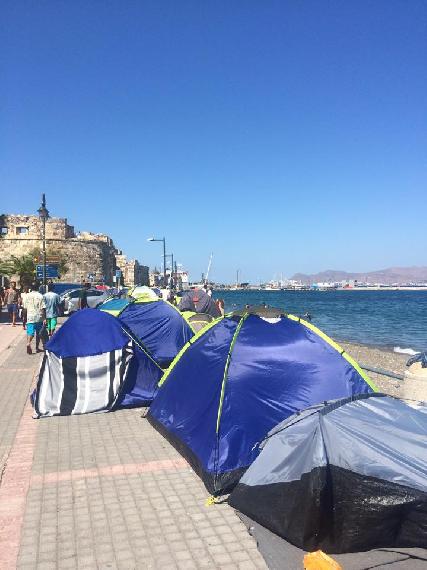
Pakistani migrants take shelter at the harbour (Photographer: Emma Stuart)
by Emma Stuart - Correspondent (Kos Island), October 4, 2015
On the island of Kos, Greece, approximately 23km from the Turkish coast, the refugee influx continues. According to a UNHCR official, numbers have declined over the past month, however, they are expecting an increase during the month of October.
“Numbers have decreased to approximately 200 per day”, the UNHCR aid worker stated, claiming that the majority of new arrivals were now of Pakistani origin, yet Syrian refugees were still arriving. “We are expecting an increase, especially of Syrian refugees in October as the weather is starting to get bad and they will then have to wait until spring if they don’t cross now”, he continued.
In comparison with previous daily figures, which at times surpassed the 1,000 mark during the summer, the amount seems low; however, local authorities are still battling to deal with the influx and process papers as quickly as possible.
While there are fewer tents and refugees lining the streets and grassed areas of the town, which have now been cordoned off with tape, the crisis is far from over. Given the fact that the majority of new arrivals are from Pakistan, Syrian refugees are having their ‘documentation’ processed quicker than during the summer months, yet economic migrants still find themselves waiting for up to one week to carry on their journey.
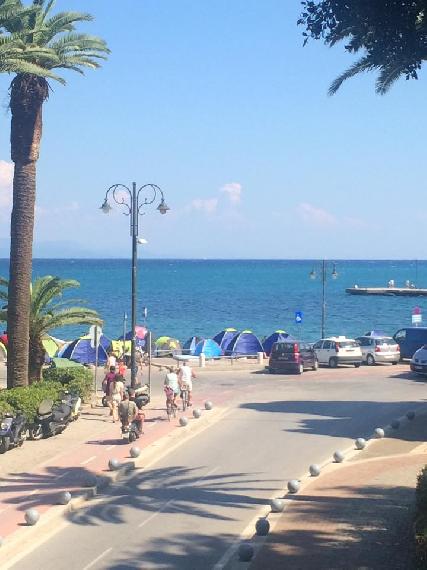
View of the harbour from the Castle of Kos
As the weather gets worse and the wind is picking up, more and more horrific stories of crossing conditions continue to arise.
According to a 25 year old local who lives in the Psalidi area of the island, she witnessed a sight that is unfortunately becoming more of a regular phenomenon.
On Saturday 3rd October at approximately 10.00pm, she was gathered with her family on the balcony of her beachfront home when she saw a light in the water. Looking out, she originally thought that it was a boat. "It was moving too slowly and moving in the direction of the wind, so I soon realised that it wasn’t a boat" she said. When the realisation set in that it was most likely a stranded refugee, she ran across the road towards the beach with other family members. "As I got closer, I realised that it wasn’t a boat and shouted to my boyfriend that it was a woman.” She said that the woman, "was screaming for help", adding that locals had gathered on the beach to assist her.
She explained that one passer-by jumped into the water and saved the woman, and within seconds more shouting began as they spotted another man in the water and a stranded boat with more refugees on it, including a small child.
According to her, the coastguard were there within minutes and as they were assisting the refugees, tourists had stopped to take pictures, to which the local man who had rescued the woman screamed at them; “Stop! They are humans, they are people, this is my island."
Sadly, the same evening, the harsh conditions out at sea led to the drowning of another infant. The baby, approximately 6months – 1 years old washed up on a beach in Lampi in the early hours of Sunday (4th October) morning. According to the local newspaper, Aegean News, the infant body was found washed up on the beach at dawn and has been taken for an autopsy. So far, its parents have not been located and it is not known whether or not there were other victims. A statement that was released by the local coastguard noted that the authorities had launched a full investigation into the drowning of the infant.
The news comes one day after two more bodies were washed up on a beach in Tingaki and again in Lampi, on Saturday 3rd October.
One 45 year old Syrian woman from Damascus, who is travelling with her two teenage children re-told the story of when they had crossed, stating that it was the “most terrible time.” She said that she was distraught, crying throughout the whole journey, and truly believed they would not make it across. Carrying aid boxes handed out by the Red Cross, the family were in high spirits and expressed positive hope for a better future in Germany.
Another Pakistani migrant from a village outside of Lahore also expressed hope at finishing his journey which started on foot from Pakistan on to Germany in order to be able to send income back to his family in Pakistan. “I have one child, 6 years old” he said. “I must help my mother, father, wife and child”, he continued. The 21 year old explained that the conditions in which they are now living in his village are intolerable and he had no other choice than to leave his family and search for a job in Europe. “We don’t have money to eat, it’s so, so bad”, he said, claiming that he wished he had another choice but he didn’t.
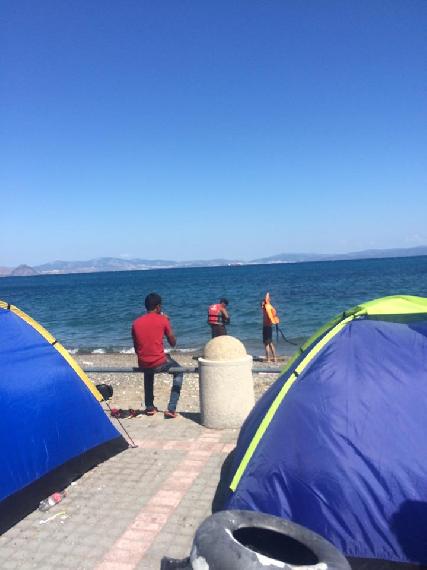
Pakistani migrant brushing his teeth while others go for a swim
The refugees and migrants on the island of Kos are now receiving constant medical assistance from Médecins Sans Frontières (Doctors Without Borders) medical professionals who are operating behind the local police station and who also provide tents to anyone who might need one.
Other charities are also starting to step up their assistance including the local charity, Kos Solidarity, which has been active all summer, relying on local and foreign support by means of donations of food, clothes and other essentials. A Dutch NGO, Interim Refugee Help, is serving meals at timed intervals throughout the day in addition to administering aid that has been donated. The UNHCR personnel are constantly present at the harbour handing out sleeping mats, blankets and torches as well as independent organizations who are handing out SIM cards to help those who arrive at the shore of Kos to stay in contact with their loved ones.
It is also rumored that an abandoned hotel on Kos was going to be converted by the charity organization, Save The Children, into a place of refuge for stranded refugees and migrants. When questioned, a representative of the charity stated; “We have conducted an assessment on Kos and are in the process of evaluating how best we can support children and families on the island – however no plans have been made as of yet.”
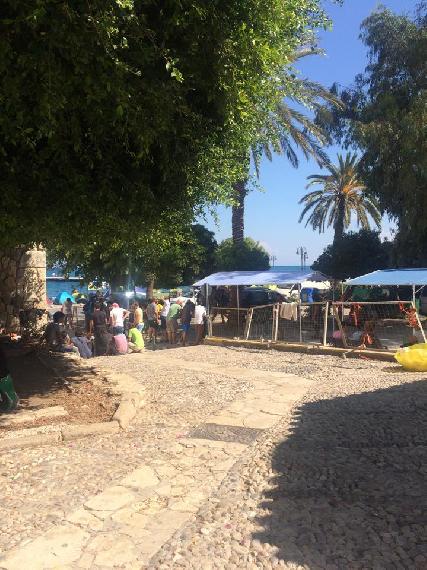
Refugees and migrants waiting outside the local police station

Nikelsdorf Refugee supply station (Photographer: Ncole Malmedé)
by Nicole Malmedé and Daniela Villeneuve - Volunteers (Cologne), September 21, 2015
TRAVEL REPORT
09/15/2015
Dear Donors and Volunteers,
After a 16h drive with two station wagons filled with baby food, medicine and blankets we traveled to the transit camps of Nikelsdorf/Austria , Hegyeshalom and Röszke, Hungary and to Szeged at the Serbian border.
Because the border is closed since Tuesday afternoon, the refugees must now take a different escape route or – most likely remain in place. Currently 20,000 people remain behind the border fence due to exhaustion. The mostly Middle Eastern refugees are at risk there, as after 30 days of continuous travel on the road, they are very-very exhausted and yet we have had only positive experiences.
We had planned to cross the border on Wednesday into Croatia to provide food and water to the trapped refugees. Due to a high military presence, humvees, prisoner transports and other military presence and the region being under a state of emergency, we decided to return.
The largest part of your donations will cross the Serbian boarder as of tonight on undisclosed routes to reach the refugees. For us, it is now too dangerous here. Hungary has imposed a state of emergency in the two provinces until midnight and we must leave the country, because the borders to Austria, even for Europeans, will be closed down.

Another view of the Nikelsdorf Refugee supply station
We are therefore exhausted, appalled about the incredible misery, full of respect for the work of the volunteers, and we now head home.
Anyone who has been here will understand that there is no such thing as a distinction between “economic refugee” and “war refugee.” Help is needed now. Thank you for having enabled us to achieve this trip.
refugeeswelcome!
Daniela Villeneuve
ADDENDUM
09/16/2015

Röszke, Hungary Refugee Reception Center (Photographer: Daniela Villeneuve)
No more than 72 hours ago, a group of four wonderful people met thanks to a Facebook group and spontaneously decided to bring relief supplies to refugees in Hungary. Without the support of donations from strangers and friends we would not have been able to come this far in 8 hours.
Monday (15.9.) at 9:45pm we started in the direction of Röszke in Hungary where help was needed urgently. After a short night (Tuesday to Wednesday) in a bed, of which the refugees we met can only dream of, we decided to visit the "geheimenKunstsalon" in Vienna to report from our trip and share information we collected and our experience. In times like these, information can be of vital assistance for the volunteers and refugees.

Nicole overlooking the Röszke, Hungary Refugee Reception Center
Once again we would like to thank all of our supporters and let you know that this won´t be our last trip.
Daniela, Heiko, Stefan and Nicole
Nicole Malmedé
ADDENDUM
09/17/2015
Back in Cologne, with the images from Nikelsdorf/Austria, Hegyeshalom, Röszke, Szeged/Hungary and at the border of Hungarian border town of Tompa with Subotica/Serbia, I still find it difficult to process, situations and experiences.
Writing as therapy aims to help.
People are on the run. People hardly have time to drink water or change into clean cloths, mothers rushing through with children drawn behind them.
Fathers are carrying their children because mothers are no longer able to. Always with fear of being stuck in a country, that at any moment may shut down the borders and declare a state of emergency. Bare panic is written on their faces.
At the end of the supply zone people smugglers are waiting! They are people without a conscience. 200 euros per person is what they ask for to bring people maybe as far as the next town taking them in trucks in the middle of nowhere without help or supply. I think that these people belong behind bars.
On the entire way of migration there is plenty of rubbish left by refugees as every ounce is a burden. Clothes can´t be washed, only changed and thrown away as they are unnecessary ballast to the refugees and hinder them in moving fast.
You can´t blame the refugees. In fact something could be done, e.g. like the blankets given by the UNHCR. Why doesn’t one hand them foil emergency blankets, light and easy to carry. For the moment, it is still very warm. But the nights are cold!
While we sit here in our comfortable apartments we know these people do not enjoy set tables for dinner or know where and if they´ll sleep tonight. A refugee told us that he was four days without water, food and no sleep. This is unimaginable for all of us here. The more I admire the volunteers on-site. These people give refugees a few minutes of the friendliness, a smile, fresh clothing, water and something to eat. These helpers often work to complete exhaustion and sleep less than 1-2 hours, because their work is nothing to what refugees are enduring.
The volunteers see that the refugees are traumatized. The worst nevertheless affects the children. How can a child understand what is going on? Handle the situation? They are not just a couple of days on the run, but weeks, even months before they find safe shelters. Then there they are condemned to do nothing for weeks. Are the laws and administration accountable? Could we be responsible for sending back a single human being at all?
How can we sleep peacefully with all these pictures? As long as we 'only' see them on television, in newspapers or on the Internet this may be possible. But once you have seen it with your own eyes, you are compelled to help. I think it is even more worse. Therefore, we do not rest. We will go there again, at the beginning of October and that is a good thing. Because to stand idly by in the warm little room to sit here is making me sick.
Nicole Malmedé
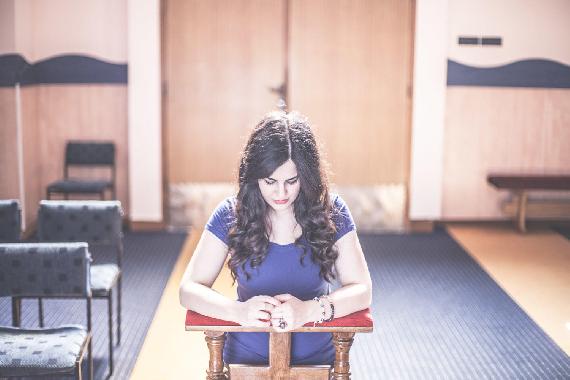
Publicity Photo of Ana Marija Saric
by Ana Marija Saric - Personal Experience (Zagreb)
I saw Syrian refugees walking on the side of the road in my hometown of Samobor near Zagreb. It was Friday evening, September 18. In all honesty, I was afraid of picking any up in my car. It wasn't because their skin, religion or culture was different than mine but because I never EVER pick up hitch-hikers, even women, even though I have years of training in classical boxing. I simply do not trust strangers.
But I saw them and my heart hurt. They seemed exhausted. I decided I would find a family to help and give them a ride to the border.
I saw three male refugees signaling the car in front of me at a red light in hopes to roll down their window, perhaps to ask for a ride or for directions, but the driver declined, possible afraid. I didn't want anyone to spread another twisted story about violent refugees so I rolled down my window and called to them, telling them to hop in.
That group of refugees I picked up were three very young men, almost boys, that looked like they could be around 18, with a cart of bags. My foot was shaking on the clutch and I hoped they wouldn't notice. I could tell by their faces they were kind and respectful as well as young and tired. Too young to fight in a war, as some people in my country claim they ought to be doing. They didn't speak any English so we drove in silence, but it was a very kind silence. I could sense their gratitude in the air.
When we came to the border at Bregana, I saw a very large group of refugees so I stopped the car to let the boys out. Immediately, I was surrounded by Syrian men thanking me deeply for dropping the young men off. I looked around and saw women and then I saw a small child run across the path and my heart froze. Children shouldn't be refugees. I wished them all good luck and drove into the direction I came from.
When I drove back I made a U-turn to pick up another group of 4-5 strong sturdy men of different ages that were walking that road earlier but I was previously afraid to pick up. Suddenly, I felt more brave. These men immediately piled up into the trunk to which I exclaimed: "No, you can sit in the front!" It moved me that they were so determined not to trouble me that they equated themselves to luggage. The eldest of the crowd sat next to me and spoke to me. He told me that I saved them for they had been walking non-stop for two weeks. I could smell their sweat and could see the utter exhaustion on their faces. He told me he had a little child at home back in Syria.
There could be many reasons why men are traveling and leaving parts of their families at home, but one thing is for certain: war is often worse for men. Men are slaughtered upon sight, while women and children are more often spared. There is rape; there is also slaughtering of women and children, but more often than not, it is worse to be a man in a war. In Kosovo this was the situation.
Women answered doors, gave money and jewelry for the aggressors to leave, while men hid under beds and in basements. This was necessary for entire families to survive. Also, this road to asylum is difficult and dangerous. It makes sense to me that a family member would go first, find a place to live and send for the rest of the family.
When I dropped off these men, they thanked me so many times and said that they hope God will bless everything I do. As they exited, one of the men who thanked me earlier for dropping off the three young men became ecstatic and extremely emotional and thanked me repeatedly. He told me he lost these friends/family members somewhere on the way to the border. They were all so very cheerful and grateful, I cannot even put it in words.
The next group I picked up was very different. There was a woman with a child and a few men. The woman was crying and screaming at one of the men. It seemed she did not want to enter the car at first. This made me realize that these refugees were perhaps also extremely afraid of who was stopping next to them on the road. As she sat next to me holding a smiling toddler, she calmed down and thanked me by blowing me kisses when I dropped them off.
I drove to the bus station to see if anyone needed a lift to the border. There were many refugees, mostly women and children with a few men waiting for some kind of transportation or to regroup with other refugees. I came up to a policewoman who was holding a child and asked her who I could assist in taking to the border. She pointed me to a family just arriving carrying a newborn baby and a toddler. The father immediately asked me how much I was going to charge him. This is how respectful they are. I told him nothing of course and the family of four piled in. The baby cried, the toddler was irritable and I could tell both parents were exhausted out of their minds. I told them I didn't know if the border was opened but I'll take them there. They thanked me deeply.
All of the refugees were extremely careful with how they handled my car. They opened and closed doors gently and moved the flat toolbox on the floor of the car so they don't step on it. There was a very strong essence of respect and gratitude in the air around us as we drove in silence to the border.
After I dropped them off, I headed home but then stopped to pick up a large group traveling with a child on foot. They piled into the trunk as well as the passenger seats. In the front sat a woman with a toddler who was quite squeamish. The woman thanked me immediately and I could hear her exclaiming every time we drove down another road. Her skin was entirely shiny from sweat and I could tell she was extremely grateful to catch a ride to the border since she had clearly been walking all day.
It was already dark and refugees were fewer. I hoped they had found a place to spend the night. I drove back to the city and then home. There wasn't a refugee in sight. As I pulled up into my street I looked around at my familiarly peaceful neighborhood. It was as if nothing was happening on the roads to the border.
Editor’s note: Ana Marija Saric is a singer, songwriter and producer of indie folk and dream/synthetic pop. You can find her performing throughout greater Zagreb as well as download her music from anamsaric.com.
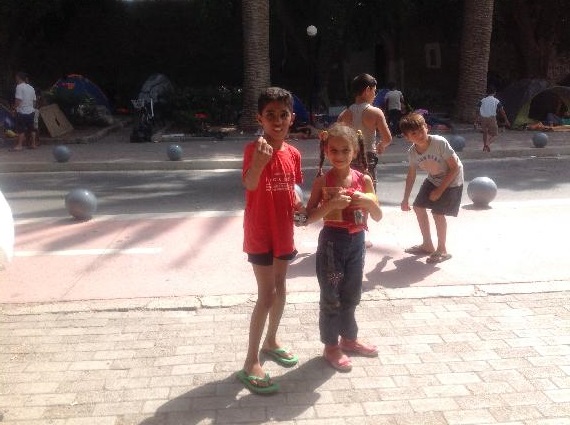
Syrian children thankful for the aid they are being given (Photographer: Emma Stuart)
by Emma Stuart - Correspondent (Kos Island), September 12, 2015
As Europe begins to recognize the plight of refugees from the Middle East, their main gateway into Europe, Greece, continues to bears a heavy weight of the influx, now surpassing that of Italy.
Over recent weeks the media has shed the spotlight on European countries such as Germany, the UK and France which have amended their conditions for refugee asylum and increased their quotas and offering refuge to hundreds of thousands of displaced victims of war. However, the situation in Greece, mainly on the islands of Lesbos and Kos, continues to mount pressure on the local people.
On Friday 4th September on the island of Kos, a fight broke out at approximately 11.00pm between what is believed to be Syrian refugees and a group of local youths. With the upcoming elections and economic challenges both internal and from the refugee influx weighing on the shoulders of the local population of Kos, tempers are starting to flare.
According to officials on the island, there are a number of refugees and migrants who inadvertently continue to defy local law and disrespect local culture, which is contributing to a raise in tensions, and officials are requesting from EU member states more immediate attention to the situation on the island.
Although many people decline to discuss the situation, two eye witnesses told us that Syrian refugees and economic migrants were the target of a group of youths who arrived and used force against them following an episode where refugees defied the local police. The engagement between refugees and local youths ended after local police dispensed tear gas to disperse the crowd.
One Syrian refugee from the Syrian port city of Lattakia - who declined to be named, stating for security reasons - who was there when the violence broke out said he had no idea how or why it started. He said “only the UN help[s] us”, referring to a group of UNHCR aid workers who allegedly had found themselves caught up in what he had described as a brawl.
Foreign volunteer presence in the form of the Red Cross, UNHCR and Médecins Sans Frontières (Doctors without Borders), alongside a large number of local volunteers, has increased over recent weeks and it appears that in the face of adversity, they are doing what they can to protect vulnerable refugees and migrants who continue to flock to this small island of Kos.
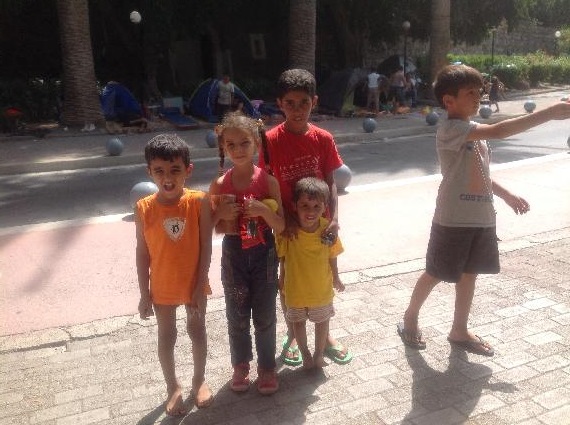
Syrian refugee children smile and pose for a picture after being handed sweets and chocolate
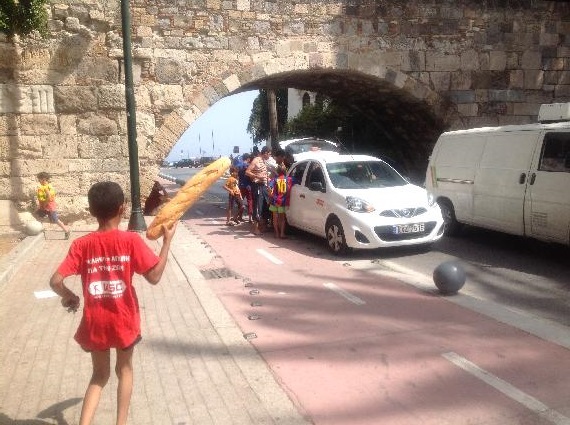
Tourists handing out bread and supplies to migrants and refugees at Kos harbour
While Europe is looking to deal with the problem from inside Syria, the Syrian refugee we spoke to rejects the notion that peace in the region may be reached sometime soon. According to the 25 year old teacher, he fled with his wife and 20 other friends and family members because he did not want to "use a Kalashnikov." He stated that his parents remained in Syria because that is all they have ever known and his father would not be forced by Bashar's regime (which is currently in control of Lattakia) to join the army due to his age.
"I teach children, I don't know how to use a Kalashnikov", he said. According to him, many of his friends have already been killed or arrested in his home town, something which prompted him to travel on to Turkey where he worked 12 hour days for 25 TRY ($8.73) a day for a period of 3 months before his wife could follow.
He stated that the he didn't want to stay in Turkey because he wanted "freedom" and to make a good life for himself and his wife who have been married for 5 months.
Telling the story of the conditions in Syria, he said that the majority of Syrian people were peaceful and that a number of different political organizations and Middle Eastern countries were forcing them all to flee. He noted that the Syrian population has decreased to 15 million from 35 million over the past five years and that as the situation escalates, more and more Syrian refugees are choosing to flee to a free and safe Europe (editor’s note: UNHCR has registered 4,100,000 displaced Syrian refugees outside of Syria as of September 11, 2015).
According to him he feared capture by Bashar's army, “no one knows anymore what people are fighting for.” He stated that alongside the threat of Bashar's regime was the threat of expanding military engagement from Russia, Iran, Lebanon and Turkey and that Russian troops are already present in the country (editor’s note: presence of Russian military personnel is widely reported and acknowledged by the Russia government for purpose of security and training).
“Syrian people also in fear [of] Daesh (ISIS) and Afghan troops (Al Qaeda affiliated groups)”, he said, and further stated that force and warfare is being applied from every which direction in the war-torn country. He continued to add that his opinion was that much of the financing and weapons are being supplied by Saudi Arabia, Qatar and Russia and that "nowhere is safe." He continued, “that weapons are handed out on the streets, hand grenades are thrown without warning and that life has become unbearable in Syria for the Syrian people.”
However, he was clear to point out that there were “good” and “bad” Syrians making their way to Europe and that he prayed to “God” that the “bad” would not make it through.
Referring to regions ruled by Daesh, he said that no Internet or television was allowed and that women were being suppressed. "We stand up when a woman arrives and we are sitting" he said, adding that "it is 2015" and "this is not Islam."
Continually expressing his disapproval of weapons and the use of arms, he added that if he were given the choice he would choose Bashar's regime over Daesh as what Daesh are doing to his people is inhumane and goes against everything Islam stands for.
After 5 days on the island he finally received his 'harti' -the Greek word for 'paper' -and was able to book ferry tickets for his group on to Athens, yet he still had no idea where he would go from there. "I don't care, I just want to live in peace" he answered when asked where they would go. Their main concern was finally embarking on their uncertain journey from Athens to Thessaloniki, then from Thessaloniki on foot to Macedonia, Serbia and then Hungary.
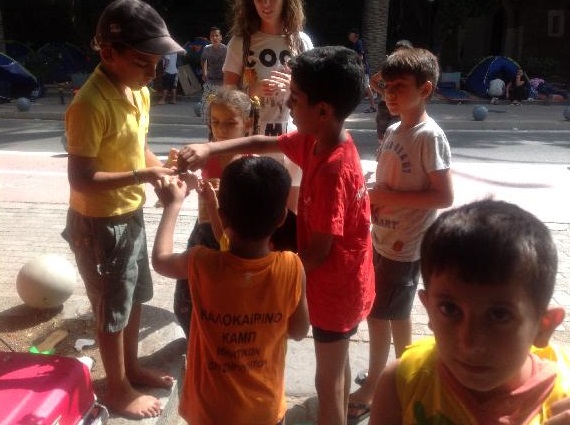
Syrian children sharing chocolate
He showed no fear as I asked him about how he feels of the journey ahead of him. Even though he has only made it to his first port of call, he remains hopeful for his family's future.
A developed country that once offered him a life is now being torn apart by war, with so many sides fighting, many of the native population no longer know what it is all for.
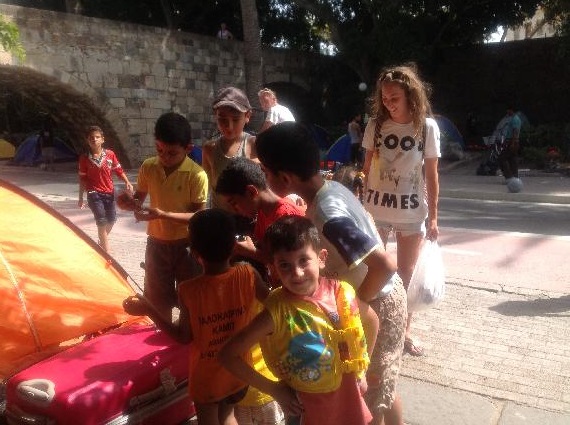
Children of Refugees sharing Sweets
While governments and leaders call for action, it remains clear by looking at the situation on the island of Kos that the refugee plight is not yet being eased. Forced to flee via illegal smugglers and on foot, under at times under extremely dangerous conditions, it is becoming ever more apparent that the current refugee crisis may call for more than just open borders.
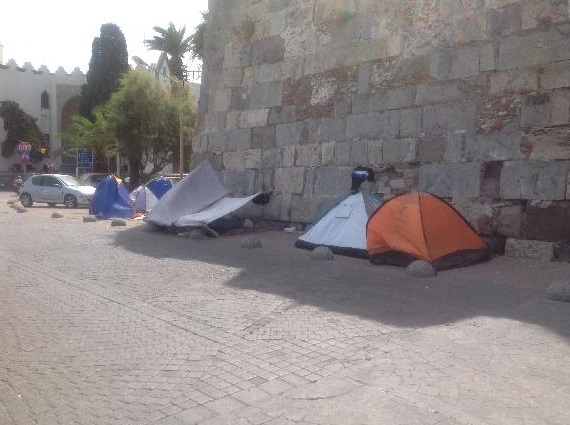
Refugees sleeping outside castle in the town (Castle of Knights)
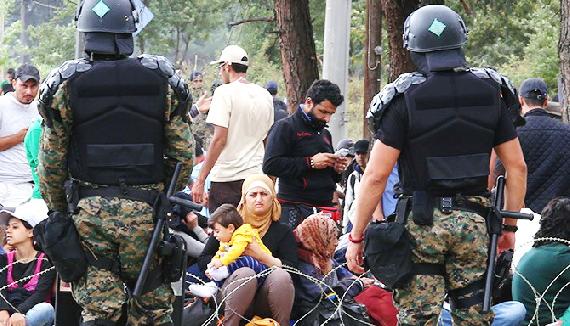
Refugees/Migrants on Greece side of border with Macedonia (Photographer: Miodrag Petrusevski)
by Miodrag Petrusevski - Correspondent (Skopje)
A large number of Middle Eastern immigrants are searching for a safe haven in Europe, the richer parts of Europe. Most of the refugees who are aiming for Germany, Norway, Belgium, Finland, or the Netherlands, countries with strong economies and a more liberal way of obtaining political asylum, have been able to transit freely through the country of Macedonia for the previous two months.
However, while making their journey they have encountered a lot of countries with an anti-refugee attitude and the problem with the refugees in Macedonia has manifested itself earlier this year with such extreme headlines as “Macedonia murderer of migrants”. The Macedonian media is creating two different realities of the migration. They, as well as the population, are divided on the topic. Some come out as promoters and protectors of human rights and the rights of the most marginalized group in the world – the refugees. Others are motivated by xenophobia and hatred, as well as fear that the refugees are extremist jihadists in disguise and a fear of Islamization. The information that the Macedonian population receives is very limited and at times serves as political propaganda.
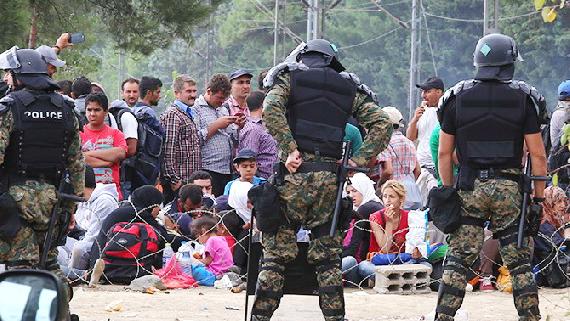
Refugees on Greece side of border facing Macedonia Border control
The Parliament of the Republic of Macedonia amended the Asylum law in the middle of June, which drastically changed the route of migration for the Middle Eastern refugees, who until then were able to reach the Schengen zone and the EU through Albanian and Bulgarian corridors. With the newly established Asylum Law, the migrants acquired a new route in the Balkans where they can transit freely. They are allowed to enter the country and within 72 days to request asylum for transit. In a few days time from the passage of the law, a surge of migrants started flooding Macedonia and since then there have been more than 3,000 migrants transiting on a daily basis.
The Ministry of Internal Affairs of the Republican of Macedonia reported that 65,658 migrants have crossed the country of Macedonia and have requested transit asylum as of the 8th of September 2015. The Ministry reports that 53,437 of the migrants are Syrian and the rest come from Afghanistan, Iraq, Pakistan, Palestine, Somalia, Bangladesh, Congo, Nigeria, Cameroon, Eritrea, and Ethiopia. The Ministry also reports that they receive from 500 to 3,000 asylum requests for transit on a daily basis. It is predicted that by the end of the year a staggering 250,000 migrants will transit Macedonia.
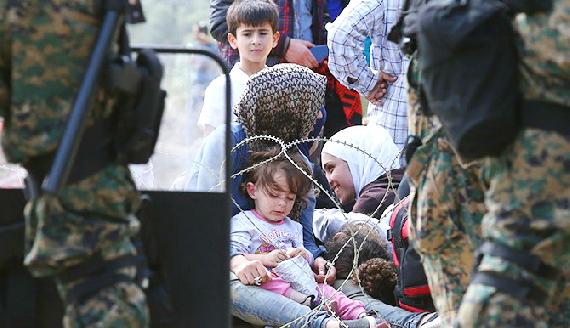
Close up of refugee family on Greece side of border facing Macedonia Border control
Refugee camps have been opened in Gevgelija, near the southern border with Greece and in Tabanovce near the northern border with Serbia. Tabanovce is their last stop in the country where they prepare themselves to expect new obstacles on their journey to northern parts of Europe.
Yusuf, a 19 year old who says that he is Syrian, told us his devastating story of leaving his hometown of Damascus. He said that he has fled because of the hell that is happening in Syria right now and he made this decision in order to avoid being drafted in the Syrian army. It was very hard for him to leave everything behind, but he simply had to do it or there would be no future for him. He would rather go to Belgium, where he could go to college and live a peaceful life.
He also reiterated that he is very angry for leaving his country because of the NATO allies. According to him, "They say that they will bring democracy to my country and all they do is bomb our homes. Now that we are searching for a new home, they only turn their heads and say that we are not grateful for their efforts to bring freedom to us." He also iterated that not all of the migrants are Syrian. "They [NATO allies] lie, because Syria is trendy right now. None in the world is interested in hearing [the situation] for migrants from Iraq, Libya, Tunisia or Afghanistan."
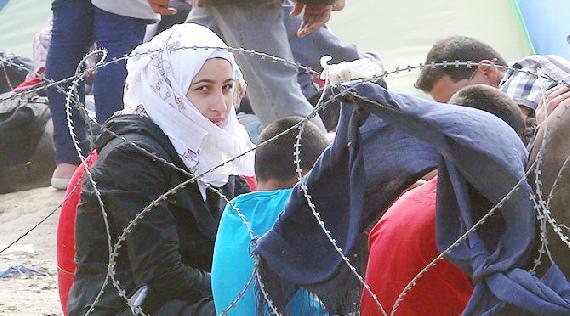
Closeup of Refugees on Greece side of border with Macedonia
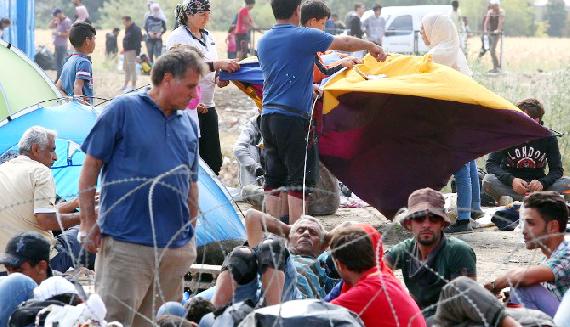
Closeup of Refugees on Greece side of border with Macedonia
When we asked about his journey through Macedonia, he indicated that he didn’t even know that this Europe was so poor and nearly all of the migrants, including himself, had no plans of staying in the country, because most of them are wealthy and would like to live abundantly.
He tried to describe what his journey was like in Macedonia and said that it was hard crossing the Macedonian-Greek border, that people were very strict. Luckily people in Greece have instructed him how to cross the border and which route to take for a fast transition. Once he was able to cross the border, he entered the city of Gevgelija where he spent a couple of hours and waited for one of the three daily trains that would take him to the border with Serbia. Now he is waiting to cross the Serbian border and is not sure what to expect next.
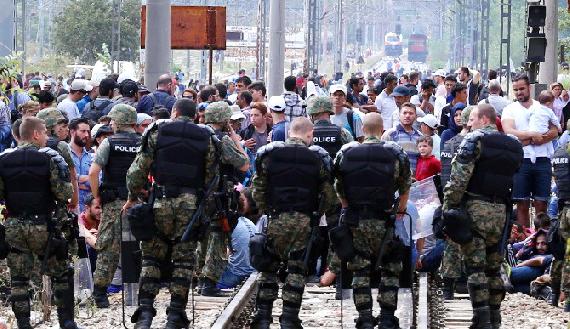
Macedonia border control at rail tracks between Greece and Macedonia border
According to the Macedonian Red Cross Organization, they have not seen so many migrants in their entire life. They are dumbfounded by the happiness and joy the migrants show when anyone shows them some attention and help.
The Red Cross teams told us that the hospital in the southern city of Gevgelija has no medicinal materials to help the migrants, but the municipality of Gevgelija and the local population have donated packs of food and water, which were accepted by UNHCR and the Red Cross and given to the migrants. They have dispatched mobile teams on the border with Greece and the border with Serbia, where they constantly give first aid kits and distribute humanitarian help with water, basic hygiene, packs of food, baby packs and baby milk. Their report is that they make from 50 to 200 daily interventions, depending from the group that enters the country and say that it is up to them and teams of UNHCR to help and protect them, along with assistance from individuals of the local population.
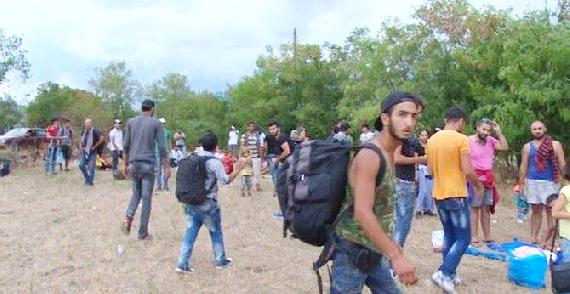
Refugees/Migrants whom have crossed the border
The Macedonian government issued a directive to put medical personnel on the borders to help the migrants; however, many doctors have been opposing this directive and petitioned the government to revoke it. The Minister for Health, Nikola Todorov, in an attempt to defend the directive said that the doctors are not currently required to be stationed on the borders, because there is no need for them there at the moment, but if a situation arises the directive would be implemented.
It is up to the Red Cross and the humanitarian local population to help the migrants in need. However, most of the people of Macedonia are still fearful of the migrants and skeptical of the whole immigration process, because the people of Macedonia are still fearful of the migrants and skeptical of the whole immigration process and even though Macedonia is striving to be a multiethnic society, the people are indoctrinated with religious intolerance, which manifested itself with the terrorist attacks by extremist Muslims in 2001 and most recently on the 9th of May in the city of Kumanovo.
An example of the public opinion that extremist jihadists are infiltrating the migrants and the characterization of the immigration as Islamic is the political spin that happened in the last week of August, when the migrants, while being on no man’s land on the border between Greece and Macedonia, refused Red Cross food and medicine packs. At first some of the Macedonian media reported that they refused the help because of the Red Cross symbol, meaning that the migrants’ faith and religious conviction did not allow them to accept the help. According to the Macedonian Ministry of Internal Affairs, the migrants did not accept the help due to a clash between them and the Macedonian police, who used shock bombs and tear gas on August 21st to control them, which was widely reported in the International press. Emotions became heightened afterwards, and it was reported that the migrants refused the help as a protest to the use of the shock bombs and tear gas. The Macedonian Ministry of Internal Affairs claims that the clash between the police and the refugees was due to an uncontrolled surge of the refugees coming from the Greek borders (editor’s note: as reported by the AP: At least eight people were injured after special police forces used shock-bombs and tear-gas to subdue an unruly crowd of several thousand migrants who are stuck between the borders of Greece and Macedonia, citing information obtained from the Greek police).
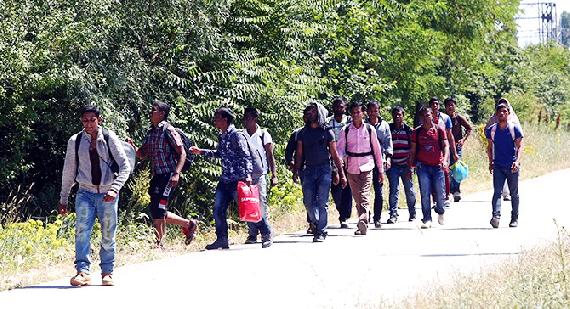
More Refugees/Migrants whom have crossed the border
The Minister of Internal Affairs Mitko Chavkov has visited the refugee camp in Gevgelija and said that around 800 policeman and army forces handled that particular surge of 8,000 refugees, but the escalation is greater as each day passes. He stated, "Our goal is human treatment and their protection while transiting Macedonia. Speaking from a security aspect, we succeeded in protecting them from organized groups and criminal networks that were transporting them illegally to the Macedonian-Serbian border."
He was joined in the visit by Austrian Minister of Foreign Affairs Sebastian Kurz, who was quoted, “It is our evaluation that the escalation will continue on and it is illogical that the problem comes from a EU member state, with which we have no contact whatsoever regarding the problem, due to our expectation of direct EU assistance.” He also added, "The situation in Macedonia is dramatic, the country is left alone in handling the crisis and there is a need for a common approach. Macedonia cannot allow unregistered immigrants to enter through Greece. The European Union must acknowledge the Balkan route as well, not just the one in Italy."
According to the Ministry of Internal Affairs, the Ministers of Internal Affairs of Macedonia, Austria, Serbia and Hungary on the 4th of September signed a Memorandum of Understanding dedicated to the steps necessary for controlling the pressure by the mixed migration that concerns the mutual countries.
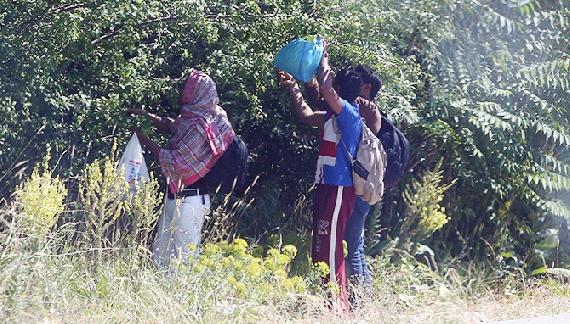
Refugees/Migrants whom have crossed the border
The Prime Minister of Macedonia Nikola Gruevski, during the Day of the Republic on the 2nd of August indicated that for now Macedonia seems to be a transit zone and the authorities are handling the global problem with ease. However, he stated, "The current condition of Macedonia being a transit can be changed in the future. Migrants from various Asian and African countries will settle in Macedonia and that will be a challenge. If anyone thinks that this migrant crisis is a surge that will soon pass, is kidding themselves. This is only the beginning of a new type of Great Migrant Period that is yet to take full charge. We are handling the situation for now, but the challenges keep growing. There will be a need of addition efforts, measures and policies."
The security services are warning that there is a possibility of a humanitarian crisis in the region, because the countries of Greece, Macedonia and Serbia are not ready, nor have the sources to help the migrants. The security services of the region also say that according to the migrants, their goal is to reach Germany, Sweden, the Netherlands and Belgium, through Hungary.
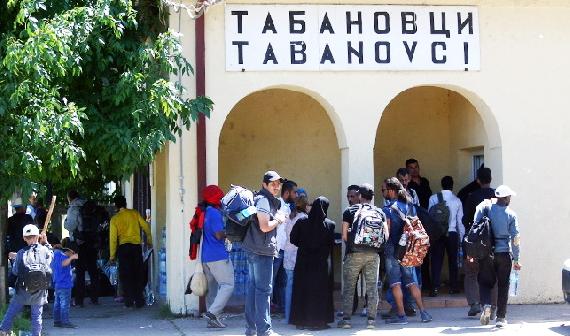
Refugees/Migrants seeking transit at border Tabanovci Macedonia into Serbia
The refugee crisis has brought some hatred towards the refugees, as well as many misinterpretations and manipulations that only contribute to the hatred. This escalating trend is requesting for national, as well as international cooperation. It is not a local problem and it would not be practical to expect a local approach for a solution. The government of Macedonia, as well as the governments of the Western Balkans are requesting a greater financial and technical assistance for handling the migrants and reiterated that the migrants are heading to EU member states and that the EU should have that in mind while creating crisis policies. With the newly amended Asylum Law the refugees are to be less exposed to risks and will be offered a more humane treatment. The Republic of Macedonia has stated it is undertaking measures to strengthen the border patrols, especially the southern border with Greece, because that is where the pressure comes from and urges for international measures for the migrant crisis that could endanger the security of the European continent.
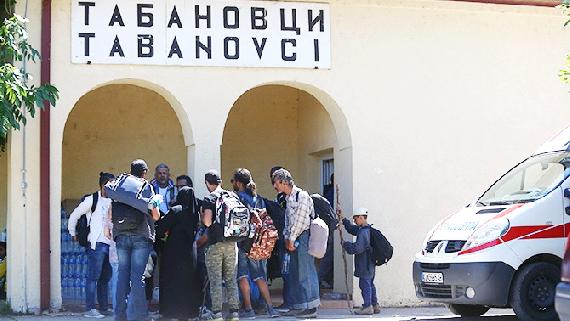
Refugees/Migrants seeking transit at border Tabanovci Macedonia into Serbia
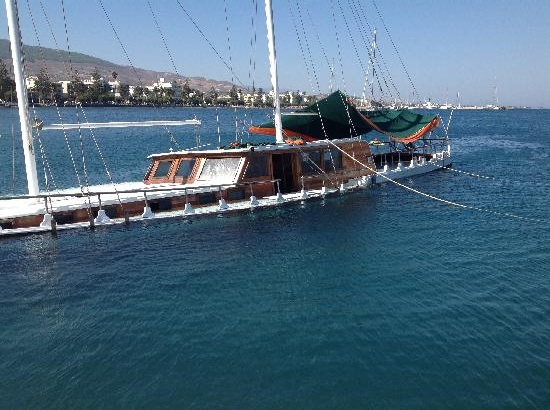
Migrant vessel sinking in harbor (Photographer: Emma Stuart)
by Emma Stuart - Correspondent (Kos Island), August 30, 2015
Following recent media coverage of the migrant crisis on the island of Kos, Greece, it appears the situation is far from resolved. Despite receiving global attention, little has been done by international powers and many migrants are still dangerously flocking to the island, urgently seeking passage through to Europe.
Every day dinghies, larger vessels and even a reported jet ski arrive at the shores of the small island in the Aegean Sea, packed full of migrants/refugees from the Middle East, Africa and Asia.
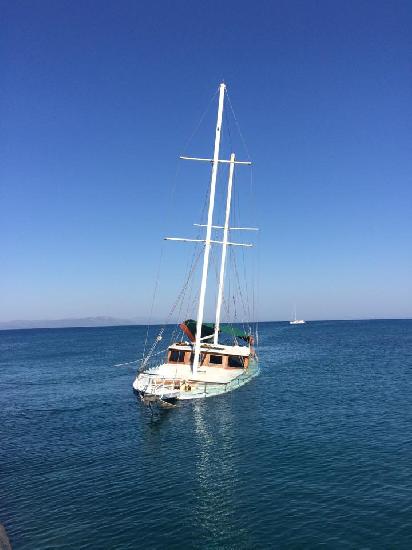
Larger Vessel - They are in such terrible condition many sink
On Friday 28 August, the 'Eleftherios Venizelos' ship returned for the third time to Kos harbour, ready to transfer up to 2,800 refugees to the port of Piraeus and ease some of the strain on the inundated island.
Ahmet, a 31 year old accountant from Damascus, was waiting outside the main police station among a throng of migrants and refugees to check that his name was on a board which lists those who will be leaving on the ship. Ahmet explained that he had been staying in a hotel, however, was instructed by authorities to prepare himself for his departure on Friday 28 August, thus prompting his check-out. When he arrived at the ship, like thousands of others, they were then instructed by local authorities and UN officials – which he says have offered limited assistance – to return to the police station and wait for the ship’s departure at 9.00am the following morning, Saturday 29 August.
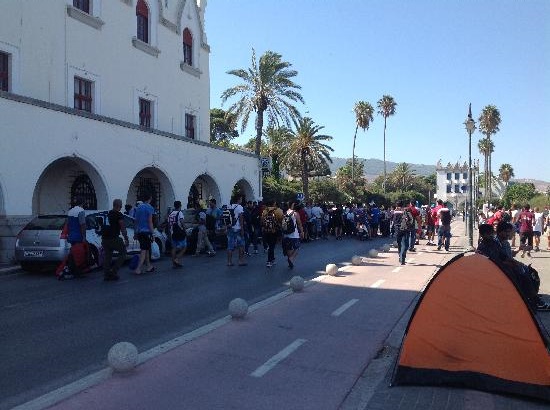
Migrants and Refugees waiting to check list for El. Venizelou
When asked where he was hoping to travel to he cheerfully replied “Finland, where it is cold!” He said that he had a friend waiting for him there and did not care what life would be like, he only wanted to get off the island he finds himself on. He said “[Kos] is a beautiful island, the people [are] beautiful, but I don’t want to stay here.” Continuing, he showed hope that one day “god willing” he would only return as a tourist to enjoy the beautiful views and landscapes the island has to offer.
Like many others, Ahmet is fleeing a war-torn Syria and has many tales of torture and persecution to share. When asked if he would return to his home country one day, he pulled out his phone and showed pictures of a tortured body. “Do you know ISIS?” he asked, telling the story of how he was captured, beaten and lashed. Showing physical signs of distress, he was visibly uneasy as he recounted the terrible experience and angrily stated “you ask me if I would go back there?”. Upset, he explained that no-one could imagine what the experience was like and he was forever indebted to God for saving his life and offering him a "lucky escape".
According to Ahmet, who is travelling with his younger brother and two friends, his family are safe for now in Iraqi Kurdistan, yet even if they wanted to flee it would be very difficult as their borders are heavily patrolled and their passports inaccessible. Unperturbed by the conditions he faced on Kos, waiting 5 days for his official documentation, Ahmet dreams of a better life in Finland, stating language and cultural differences were the last things on his mind. "Anyone can learn a language in a year if they really want to" he stated "the war is over for me now and Insha' Allah (god willing) better days are waiting for me."
Refugees at the harbor, outside the police station on Kos, find themselves waiting for days on end for their official documentation to be processed. One father from Iraq said that he had "no idea" when his family’s documentation would be ready, already enduring a seven day wait. Lacking official identification and passports, his wife and two children are resigned to sleeping alongside the town’s castle with other Iraqi refugees while officials scramble to process papers as quickly as possible and identify those who lack any documentation whatsoever.
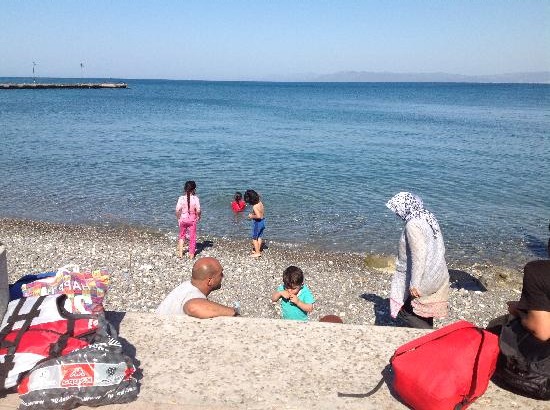
Refugee children eating biscuits and swimming
Needless to say, migrants and refugees who are not in possession of a passport or official documents are refused access to any of the island’s hotels.
The man’s children, however, sought comfort in playing with other children. Some youths innovatively creating 'lilos' out of discarded life jackets and scrap they find lying around the beach, some others bringing life to the sidewalks by coloring the stones with chalk and playing games given to them by locals.
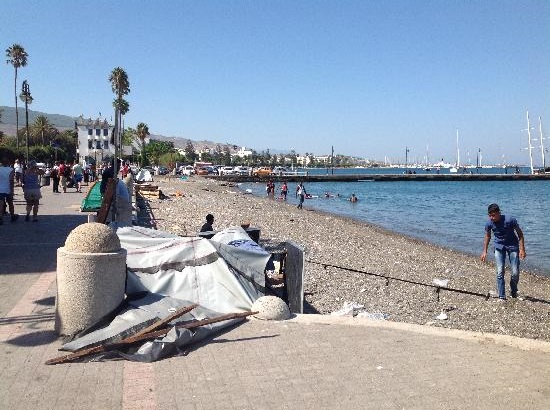
Migrant Children playing in sea
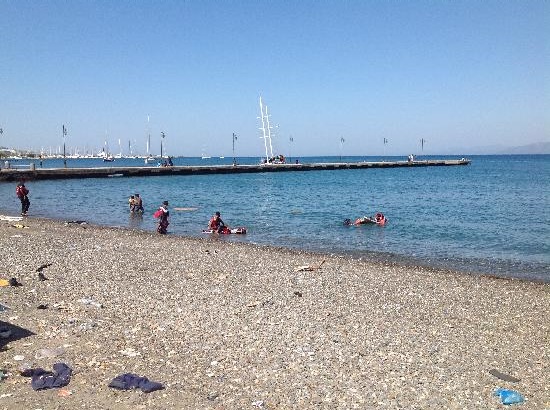
Children make makeshift inflatables
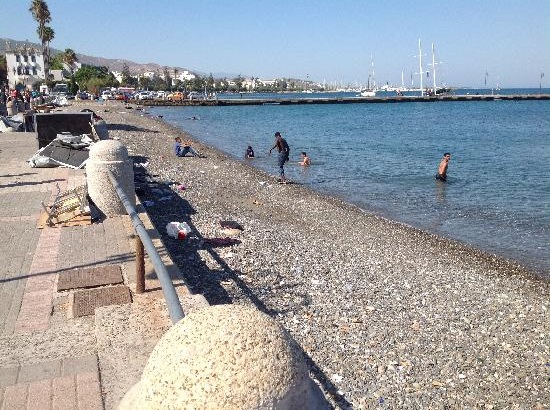
Refugees and Migrants swim
Even though there has been a slight reduction in the number of refugees arriving and a large number have now left the island, the problem is still visible all across the town. Tents still line the harbor and many economic migrants continue to take refuge in the Captain Elias hotel in the Lambi region of the city and its surrounding fields.
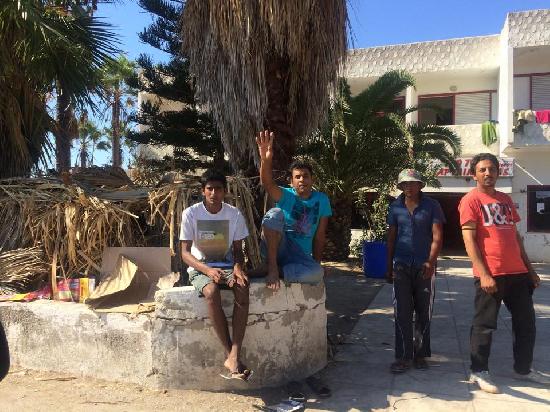
Economic migrants from Pakistan at Captain Elias Hotel
As a number of migrants and refugees pointed out, their situation is not the same and many of the minorities are “sticking together”. They must all register at the police station in Kos town and there are occasions where conflict arises. Many are unable to understand why their documentation takes longer than other nations, unfortunately failing to recognise the difficulties surrounding those who are seeking economic asylum and those who also lack identification of any kind.
Saber, a 34 year old Pakistani national who is staying at the Captain Elias hotel states that he has no money and this is the main reason he travelled for thousands of miles. Desperately seeking economic asylum, Saber retold the story of walking for days, over mountains and in harsh climatic conditions from Pakistan through to Iran, Northern Iraq and eventually on to Turkey where he was then sent to Kos. "We did not know where we [were] going." He said. Paying up to $3,000 USD per person, he said that he wanted to work so he could send money back to his family who are living in a village a few kilometres outside Karachi.
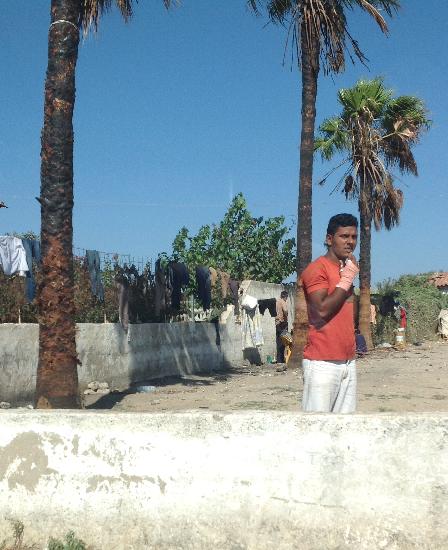
Migrant at Captain Elias Hotel
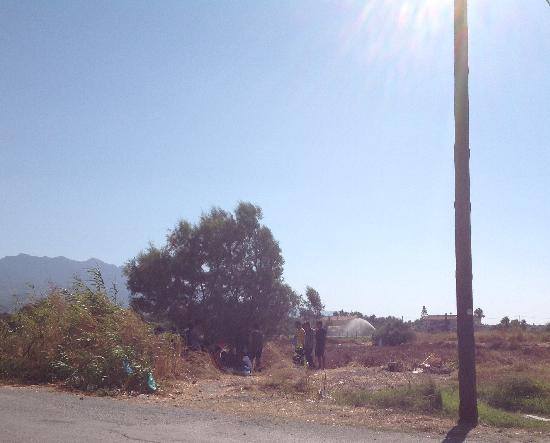
Pakistanis seeking shelter from the sun
Many others from Ethiopia, Nigeria and Bangladesh, who also reside in the hotel and surrounding fields, express hope for a better economic future. Fleeing poverty, they indicate no preference as to where they might end up, their only aspiration is to "make money" and return to their families when they have made enough for a comfortable life.
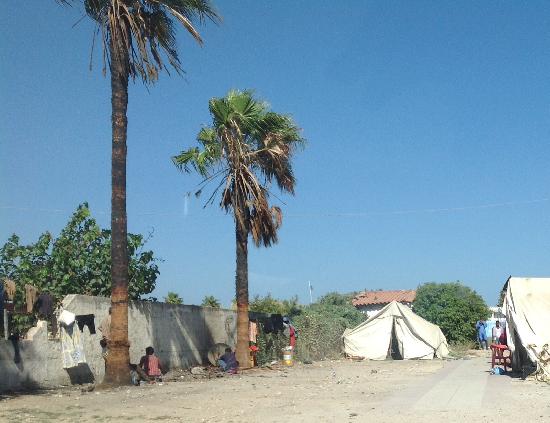
Tents on the grounds at Captain Elias
Some travel alone, others are making their way to family abroad. As Saber pointed out, he would find a place to settle and once he has made enough money, his oldest son would come and take his place in order for him to return to his wife and remaining children in Pakistan.

Makeshift Homes at Captain Elias
While some are calling for a permanent ‘welcome center’ to be built on the island, the local Mayor, Mr. George Kiritsis, and a large majority of the local population believe that this would be to the detriment of a small island that itself is struggling financial hardship. Recent political turmoil in the country and the upcoming general elections have only made matters worse on the island for both locals and the migrant community, many believing that the situation will not get better and that the impending autumn weather may spell widespread disaster.
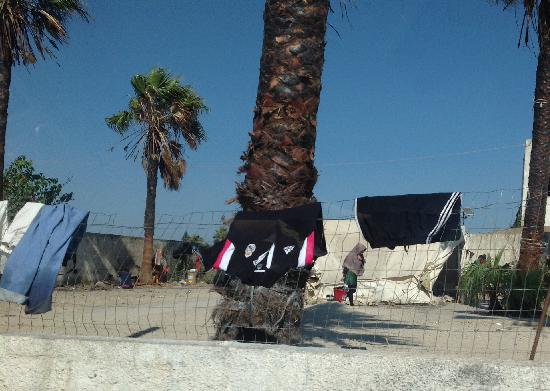
More makeshift homes at Captain Elias
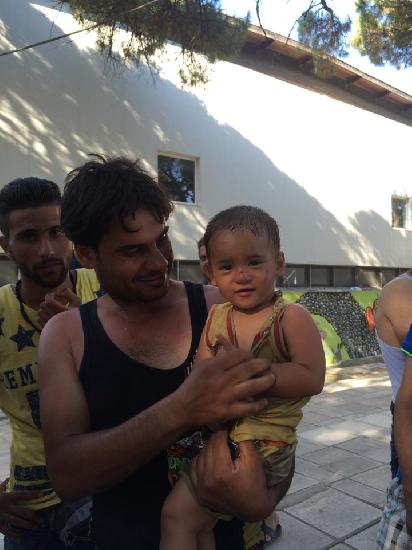
Syrian Refugee and Child
by Emma Stuart - Correspondent (Kos Island), August 18, 2015
Over recent months the southernmost island of Greece and edge of the European border, Kos Island, has been struggling with an ever increasing influx of refugees and migrants from neighbouring war-torn and poverty stricken countries. The current situation on Kos Island, with an estimated permanent population of 30,000, has meant that at any one time there can be up to 7,000 refugees and migrants on the island, and in a single day there have been up to 1,000 new arrivals.
Since the refugee crisis began earlier this year, over-stretched and under-resourced authorities on the island have been struggling to deal with the unexpected and ever increasing inflow of refugees arriving on their shore.
The refugees typically are paying between $1,200 and $2,000 per person to make their way to the shore of Europe on Kos Island from Turkey by dingy. One source claimed that passage on to Italy could cost up to $6,000, forcing many to choose the closer destination of Kos Island.
Despite their long and costly journey, morale remains high among many of the refugees. When questioned outside the local stadium in Kos Town, one day after the clash between authorities on August 12, many were keen to put forward that their main problem was having to wait anywhere between five and ten days for their temporary immigration papers to be processed.
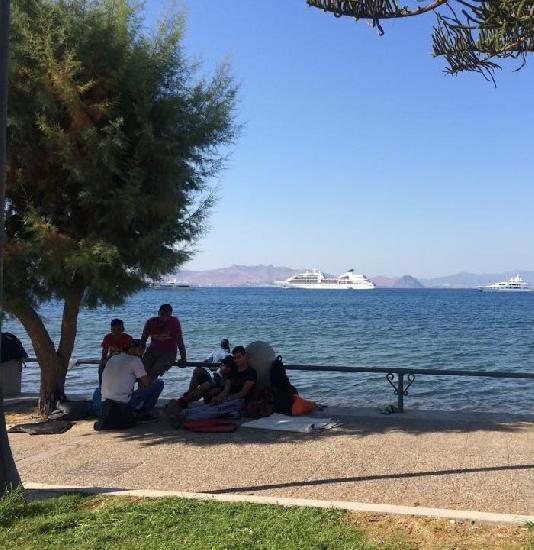
Refugees living in the open air
One architect from Damascus who, for security reasons could not identify himself, noted that the people on Kos "are very, very good people". Eager to share his opinion, the 60 year old refugee who was traveling with five family members stated that the conditions on Kos were "paradise" in comparison to what they had left behind.
He commended the local people for rallying support, supplies and prayer for the destitute throngs of migrants and refugees. Pointing to the people around him, he stated that many Syrian refugees came with money, however, the island was expensive. Even though he could afford to stay in a hotel and feed his family at a cost of up to €50 ($55USD) per person per day and up to €200 ($220USD) per room per night, many others couldn’t and his money too would soon run out.
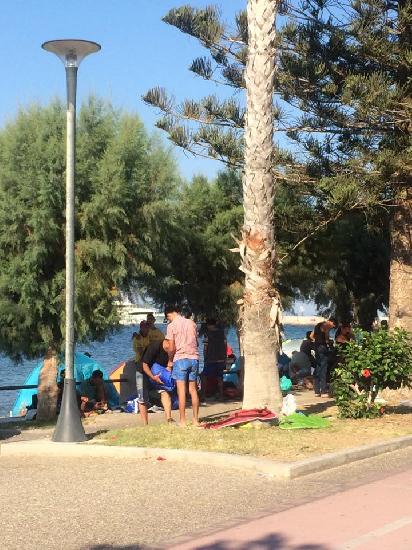
Refugees setting up an encampment
The man told recounted stories of war, brutal conditions and a corrupt government which for the past five years has starved its people, now leaving them with no electricity and water, while international governments and leaders did nothing. He explained how the first time his grandchildren heard a bomb explode they were afraid, but by the third time they were unfazed. "After living under the conditions we have been living under, we are not afraid of anything", he said.
Like many others, the man is desperate only for his temporary immigration papers to be processed. He pointed out that the violent clash that erupted on Wednesday 12th August was due to refugees fighting to get their papers processed and authorities not being able to keep up with demand - finding themselves terribly outnumbered. "There is nothing anyone can do", he said, "people give us clothes, food, prayers, but we [do] not want that, we just want to go", thoughts that are echoed by many other Syrian refugees who claim their biggest concern is making it off the island to seek out their families elsewhere in Europe before their money runs out.
Many refugees agree that not enough is being done by authorities. Another man stated, "even if we talk to the press and all the big news channels, nothing will happen, nothing will change for us." While they find the conditions on the island far from ideal, their main concern is to continue their journey onto their loved ones in order to start work and a new life.
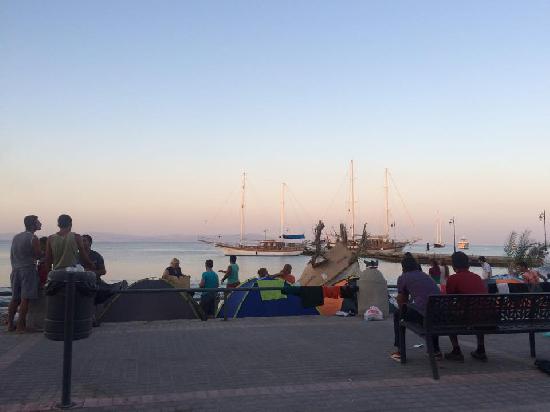
Refugees camped on wharf
When asked why they do not want to stay in Greece, many cited the current economic state of the country as unfavorable.
Local citizens have also voiced their concerns, many struggling to keep their businesses open and alive as the summer tourist season, and their only source of income, deteriorates in front of their eyes. Beaches, streets and fields in the town are piled with litter and the local municipality possesses neither the funding nor manpower to deal with the growing issue.
Despite the challenging living conditions, however, smiles are in abundance. When asked how they find the courage to smile, the answers echo one another; hope. Numerous refugees stated that even though they are frustrated by having to wait and the lack of facilities and medical attention available, it was all worth it.
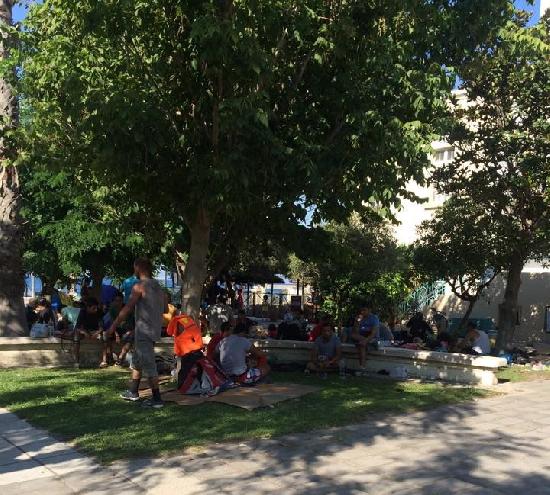
Refugee encampment in park
Inspired by the prospect of being reunited with family across Europe, namely Germany, Holland and Norway, all they want is to be safe. Desperate to work and provide their families with a secure future, many refugees make a strong case for carrying on their studies or finding work in their field, including medicine, engineering and teaching.
An Iraqi teacher who traveled from Bodrum, Turkey to the island five days ago told the story of how she came across in a small dinghy with 60 other people and was forced to throw her belongings in the sea due to overcrowding. She retold the story of a cold, dark journey that was guided only by "God" and her desperate need to protect her children and two brothers.
When the English teacher, however, arrived on the island she felt extremely let down by authorities and global organizations, reciting ignorant attitudes and a lack of support. Luckily, she said, she had money to buy one tent for her family to share, and can for now buy water and food. However, she has nowhere to shower, go to the toilet or charge her phone - a necessity many on the outside fail to recognize as such, misconstruing the war-torn country for a third-world country.
Unlike others, the middle-aged teacher expressed disappointment at the attitude of some local people, she said, “we are people too and that we have a need to bathe and use the bathroom just as others do”. Her daughter, who wears a pink tourist 'Kos' t-shirt, expresses excitement at showing her skin and looking 'European'. Like many who have shared their experiences, she wants to make it to Germany to give her family a future and to let her children play and ride a bicycle like the young children who pass by her tent every day.
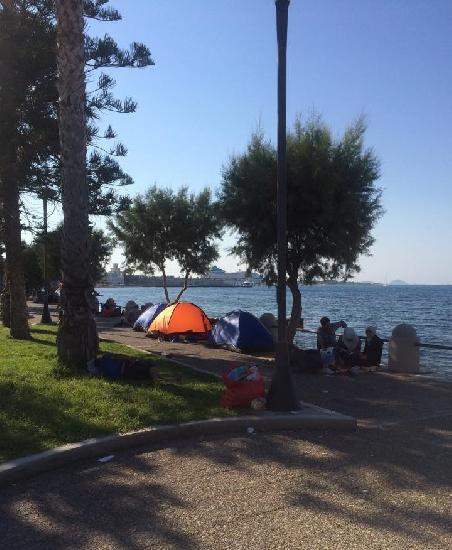
Another refugee encampment
While some refugees are able to support themselves for a short period of time, it is apparent that many are not. A weak infrastructure on the island has forced locals and volunteers into providing any aid they can amid the chaos and disorganisation of the situation, conditions that often mean efforts get lost in translation and become useless.
Lack of funding, personnel and outside pressure has forced authorities to process Syrian refugee applications faster than other nationalities, including Iraqis. Many of whom are now outraged, validly claiming they are also suffering under the same suppression and war as the Syrians.
It becomes clear upon talking to the refugee population that wherever they come from, be it Iraq, Afghanistan or Syria that the conditions they have been living under are simply "hell on earth" as one refugee described it to me.
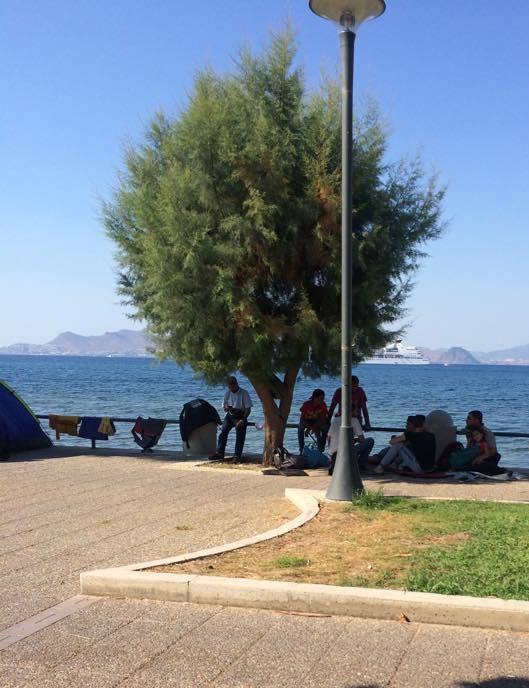
Refugee group with child
A young business graduate from Aleppo stated that many people do not leave their home during the daytime in Syria. A fact supported by many others, including Iraqi nationals, who described the harsh conditions of aerial bombings and attacks from various sides now making life dangerous for anyone who walks the streets.
The business graduate stated that, "it is not safe to sit anywhere, it’s not safe for anyone." Yet, even though the young 22 year old had to leave his family behind, he states that “life continues” and he remains guided by an open-mind.
There is widespread concern on the island of when and how this processing of temporary immigration papers will be resolved, both from locals and refugees alike. Though both parties are frantically seeking to do the right thing, misunderstanding is without a doubt leading to raised tensions. While the island is left to deal with the problem, lack of structure and communication continue to cause unnecessary divide and weaken confidence that an effective solution will be reached sometime soon.
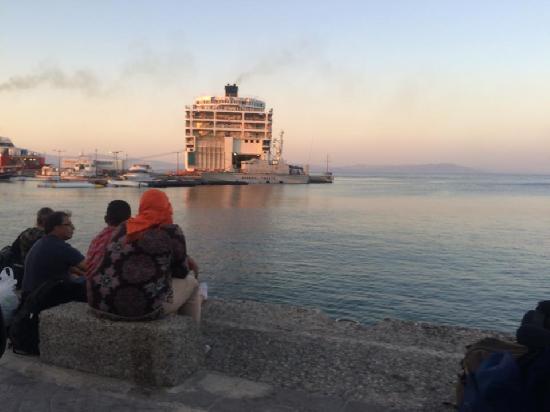
Refugees awaiting arrival of Eleftherios Venizelos ferry to process temporary papers
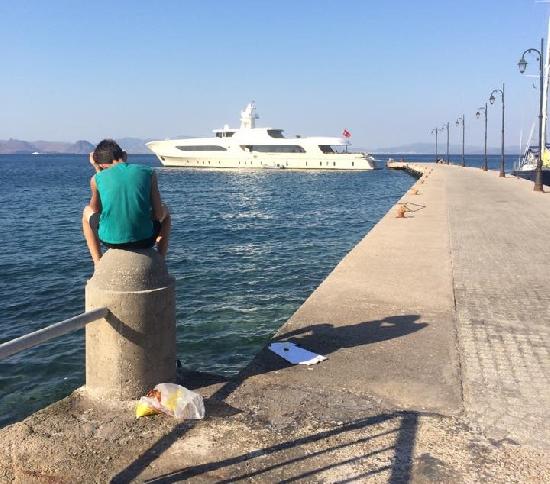
A lonesome refugee